#but what I find the most interesting is the difference of their core personality trait
Explore tagged Tumblr posts
Text
*sighs*
I understand now...
I have found the keywords.
"Italian mafia with bombs"


... technically speaking Gokudera is only half-Italian but you get my point, right? 😂😭
pro-tip: if you ever wonder why one or two of your current fictional crushes seems to be different from your usual favorite type of fictional characters, just look at your list of past/childhood crushes and you may find some unexpected results hashsdkdkdlldl
#tokyo debunker#tkdb#tdb#romeo scorpius lucci#romeo lucci#katekyo hitman reborn#khr#gokudera hayato#and if we're going to list some other of their similarities.....#bad-tempered and foul-mouthed#hella smart#right-hand man of mafia boss? (since Romeo refers to Taiga as boss too...)#what else? hmm... maybe the fact that they do a 180° turn of personality when the object of their *ahem* obsession is right in front of them#but what I find the most interesting is the difference of their core personality trait#if Romeo can be represented with the words “greedy”#Gokudera can be represented with the words “loyal”#... and these core character traits are shining the most when they're interacting with their object of obsession...#so yeah anyway I end up getting hit with nostalgia when trying to find pictures for this post...#I will proceed to lie down in the corner now while contemplating if I should reread or rewatch KHR! after ten years of discovering it.....
23 notes
·
View notes
Note
Is there a certain way you go about the characterizations of the different incarnations of Eclipse?
Their motivations!
So at his core, Eclipse is an angry, paranoid, spiteful, arrogant, lonely, possessive, socially-inept person who can't communicate to save his own life. No matter where in his life you're writing him from, these traits persist.
The differences come in what his goal is, and which of his core traits are being amplified because of it.
I've written the Original Eclipse the least, mostly because I actually got interested in the show following his death 8'D. This Eclipse is the most closed off of all of them, the least likely to change his mind, the angriest and most vindictive. He hasn't been betrayed yet, he hasn't really failed yet, so his arrogance is at an all time high.
On the flip side, after his defeat and expulsion from Sun's head, this is also the rawest point in Eclipse's life. There's a lot of good fics about scraping his broken ass out of the woods and patching him up, and for good reason. Strip his arrogance away with his loss, and he has nothing.
My favorite is the Backup Eclipse. Eclipse 2.0, my beloved! Still arrogant, still angry, but spite is his strongest trait. He was defeated and he knows it, and he's learned that he needs to be a bit smarter in manipulating those around him. By escalating the game to the next level when he amplified Moon's kill code (giving us the guy, Kill Code), Eclipse started a chain reaction that is STILL going on in current canon.
The Backup is my favorite because his characterization runs from one end of the spectrum to the other. He comes back as a bedraggled version of himself, forced to deal with basically being Bloodmoon's prisoner while also getting them to work for him. He manages to enact one victory after another, culminating in him actually gaining the star. He did it, he won!
And then he fucking crashes.
Possession and loneliness are his strongest traits in the second half of his arc, and he picks up depression as well. Spite has become bitterness. Eclipse was never supposed to win, and he knows it. The star was only ever a means to an end, a way to get Moon's attention. And when Moon resets himself... Eclipse doesn't know what to do. He attempts to respark that rivalry, but New Moon isn't interested.
With no goal to latch on to, Eclipse crumples under his own misery and lack of purpose. On his way to winning, he destroyed everything that made his life interesting.
And then he got space lasered.
And then finally Eclipse 3.0, the Recreated Eclipse. I don't make a distinction between who he was before Lunar blew up his body and after, though I know some folks do.
Eclipse 3.0 starts off with anger, of course, and a lot of confusion and desperation. For a good amount of time in there he was p much feral. This one is mired in self-pity, and lashes out because of it.
Because that's what makes this one really interesting. He's picking up from where the Backup left off-- he has no purpose. I think he sunk his claws into the goal of 'find my creator' just to HAVE a goal. He's also interacting regularly with other people for the first time in his life(s), even if he does spend a lot of time taunting Moon for stuff that neither of them were personally there for.
Two things, I think, really helped Eclipse start stabilizing. The first was, uh. Solar's death 8'D More specifically, it was Puppet giving him an impossible task to focus on, and Eclipse always needs a goal. The second was Earth started socializing him. Which I love-- hell, I wrote that myself back in Sunk Cost. Earth always had the advantage of not being personally victimized by Eclipse like her siblings were, which let her be more tolerant of him.
Eclipse in his current state is still arrogant and possessive, and his people skills still suck. He's 'better' as a kind of side effect to Puppet's request; bringing Solar back, doing this Super Important Thing That Even Moon Failed At? Was a major ego boost. Eclipse learned a very important lesson:
Doing good things gets you attention and praise.
Which is why I think he had such a rocky start with the new dimension Sun and Moon 8'D He was chasing the high of being the hero, at the cost of actually paying attention to what was going on. He knew how things were supposed to go, that made him The Smartest. He's a good guy for extremely selfish reasons XD
But he's also finally made it to where a lot of fanfic authors have gotten him. A little less lonely, a few wounds healed. He does have people he cares about, without any intent for manipulation involved.
So yeah. I guess in summary:
Original Eclipse (Upright): Vindictive, angry. Would bite your hand off rather than take it Original Eclipse (Reversed): Lost, bewildered. A feral animal, but one that can be tamed.
Backup Eclipse (Upright): Spiteful, serious. Lost the game once already, has no intention of losing again. Backup Eclipse (Reversed): Bitter, desolate. An Eclipse without a purpose, can be coaxed onto new paths. Still will probably bite you a few times first. Recreated Eclipse (Upright): Arrogant, possessive. The end goal of many a fanfic, actually able to get along as a functional member of society... mostly. Recreated Eclipse (Reversed): Feral, desperate. Clinging onto what fragments he has in a life he didn't ask for, and hating every second of it.
Idk if that was useful but there you go!!!
#thanks 4 the ask!#the sun and moon show#tsams#my bias towards the Backup is so obvious he's got the biggest chunk ndfgk
118 notes
·
View notes
Text
Been seeing a lot about writing Spencer "accurately" online and idk where this wave of criticism is coming from, but I need every single one of you to be so fucking for real rn. Yapsesh below the cut.
Spencer Reid is a fictional character. Fiction means he's not real. He's a not real character from a not real universe. There's no "wrong" way to write a fictional character.
There is no canon guideline on how to write every part of him. Yes there are certain traits and characteristics we're shown, but people are complex. What we see the character do on screen isn't a complete representation of how they live every aspect their life.
Even the show runners couldn't get him "right" all the time, Hell, Mathew himself deviated from Spencer's canon traits sometimes. For example: his birthday, the fact that he's a germaphobe but you can still see him shake hands with characters when he normally wouldn't and there's SO many more if you just watch the show and pay attention.
Also there are things about Spencer that the fandom has deemed canon when they are not, in fact, canon. Like the converse: it's commonly believed that Spencer has a preference for wearing converse, which is wrong. That's a purely MGG thing. Spencer only wears converse in a few episodes through out the whole show. Most of the time he wears formal/work footwear, like loafers.
Now, there are definitely aspects you can't take away from a character in your writing because that's what makes the character who they primarily are. You'll notice that even in most alternate universe stories, Spencer still has the traits he's known for. IQ of 187, eidetic memory, socially awkward genius. That's literally how he was intended to come across during the initially seasons.
We only got new traits as the show progressed. Like how he's a sassy little shit who isn't scared of authority. The reason we can deviate from those is because they're not his core traits. His personality changes throughout the show. At times he appears like his same socially awkward self, but we also get to see his confident side with strangers at times.
It's literally impossible to label him a black and white character because there's so much we don't get to see. We don't get to see how he acts with love interests in every season (every season is a slightly different version from the last), we don't get to see how he acts when he's home alone, how he changes in so many aspects of his life. I think I'm just repeating myself now, but I think you get the point.
I find comfort in Spencer Reid's character, which is why I write about him. He acts however I want him to act in my writing because that's how I see him. Everyone has their own interpretation of the character. A lot of the interpretations share similarities with each other, so they're deemed as "the right way to write Spencer" by us, but that's not possible because there is no right way.
All this to say: Please stop criticising writers for how they write a character. You don't have to agree with their interpretation. There are other writers out there who you may agree with more. Engage more with them and disengage from the content you don't want to see.
#ignore any mistakes I'm so tired rn#; discusses#spencer reid#ssa spencer reid#dr spencer reid#criminal minds#criminal minds thoughts#spencer reid thoughts#the bau team
212 notes
·
View notes
Note
What do you think about Sunday and Aventurine? and their interaction in 2.1, I know Sunday did what he had to do but I just have a strong dislike for him ever since. He is an interesting character though.
I mentioned on a previous ask that I wanted to talk about narrative foils/character parallels, and that ask mentioned Aventurine being similar to Robin and a little to Sunday. But I thought I'd combine that character foils idea with this post about Sunday because...
Aventurine and Sunday are Near Perfect Character Parallels

(Also sorry to Youtuber Fayato who I screencapped this image from; I literally couldn't find a single other good image of Aventurine and Sunday in the same frame!)
In media, the concept of the narrative foil refers to a character who contrasts another character; by setting the two characters and their plots side by side, the audience is better able to understand the traits of the central character.
And by setting two surprisingly similar characters in opposition to each other, it becomes very clear how even those facing similar circumstances can take diametrically opposed paths in life.
First, let's start with the basics:
Aventurine and Sunday are both characters whose real fathers were never in the picture, and who lost their mothers right in front of their eyes to traumatizing events.

They both experienced the violent deaths ("death" in Sunday's case) of their sisters.
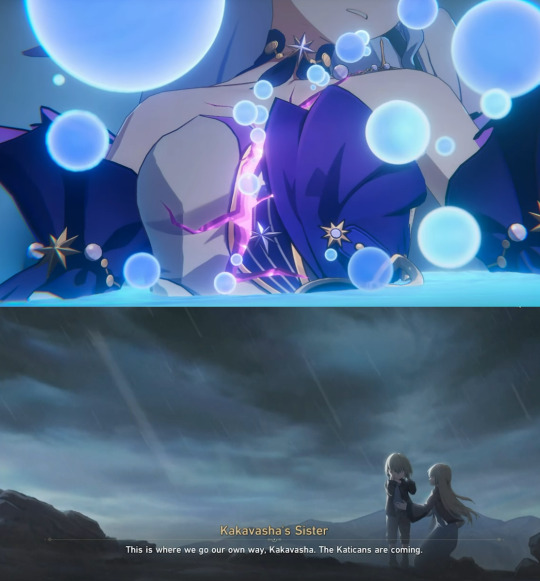
They both were "rescued" by people who intended to use them by growing them ("grooming them" in Sunday's case) into a figure of authority.

They were both told they were "chosen ones" growing up. And yet ultimately this status as the chosen one is in doubt: Aventurine isn't sure if his family's faith is real, while Gopher Wood tells Sunday that Penacony's chosen should have been Robin all along.
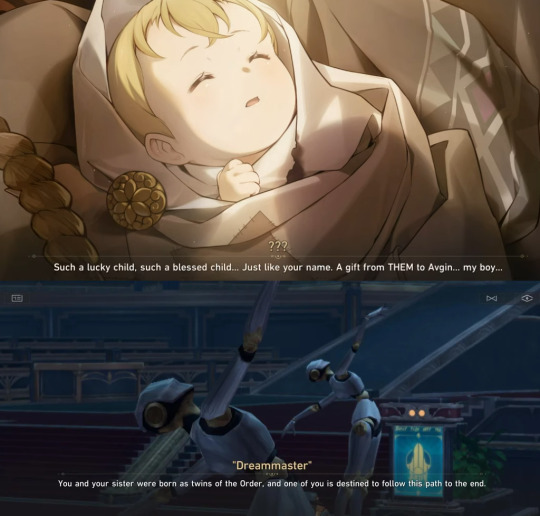
They both became self-sacrificial, Aventurine through his obvious willingness to throw his life away, and Sunday through his plan to remain outside the sweet dream to be its keeper while everyone else got to live in "paradise."

They both are trapped by their situations, Sunday by his inability to leave the cage, Aventurine by his inability to accept the life he isn't able to throw away.

They both became the "villain" of their respective patches and both faced "death."

Personality-wise, they both strongly favor being in control, to the point that their scene together is an aggressive power struggle over each other.

This is how the "future" Aventurine describes himself:

Does it sound familiar? It should, since that's exactly how people describe Sunday.
But they also both prioritize their families, and they are equally altruistic at the core while seemingly self-centered on the exterior.
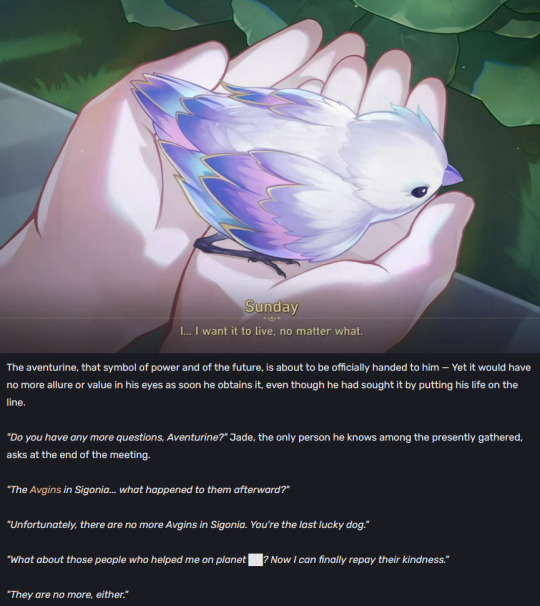
They both, of course, have the blessing of an aeon.

And here's where I'm going to take a massive tangent, but it's important: I do tend to be among those who think there is at least some connection between Ena, the Order, and Gaiathra.
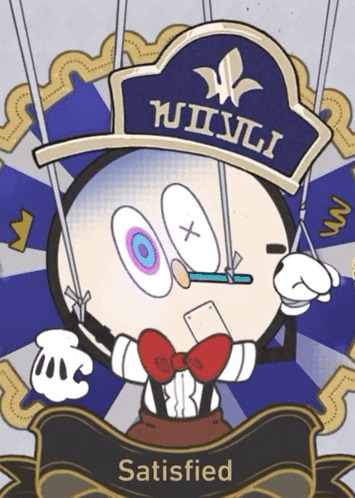
I've heard all sorts of reasons that they can't be two different concepts for the same being, from the whole "Gaiathra is a goddess of trickery and that's not related to order" to the whole "the Order's followers worship with song while Gaiathra's followers specifically don't," but I think something that has been missing from the discussion of Ena and Gaiathra's possible connection is that "Order" as a concept has entirely different definitions depending on which cultural context you approach it from.
The most mainstream modern concept of "Order" is something that is imposed: A power from on high descends to quell the chaos of the mortal world, to "bring order" through guidance to humanity. This is very Abrahamic, very modern Christian, and that is reflected in the imagery surrounding Sunday. Sunday, as a manifestation of the Order's power, believes he will be able to uplift Penacony from the mire, free people from their unfulfilled desires and confusion, and bring about perpetual peace by enforcing his understanding of harmony on the populace trapped in the dream.

Sunday's Order is not the natural state of the world but something that must be carefully cultivated and maintained, a constant battle against the chaotic forces of life and its temptations. This type of "Order" promises an idyllic future, but at the cost of the present freedom of everyone who submits to the law, who must surrender their original fate for a structured sweet dream.
We understand this concept of "Order" because at its core, it's the one that modern societies largely embrace--ruling authorities establish laws that must be followed at all costs, even when they risk the freedoms of individuals, because they ultimately (supposedly) support a greater good. A majority of society adheres to the laws handed down from on-high, and life functions relatively stably.
Yet this conception of "Order" is predicated on the idea that the course of people's lives is decided first and foremost by the people themselves--which is why they can make mistakes, go astray, and need to be shepherded in the first place.
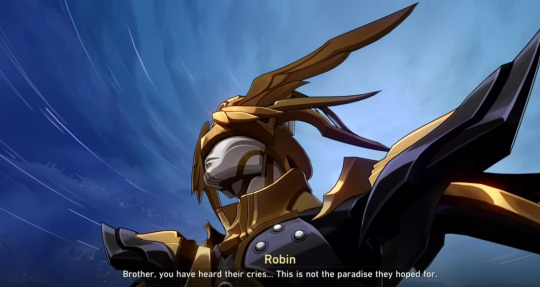
Without imposing structure through authoritarian power, this type of "Order" will crumble away in an instant, because this view assumes that rightness can only created by humanity, and that chaos--not order--is the natural state of existence.
Ena, who holds worlds tidily contained in her hands, who is tangled in puppet strings, who wears a hood like a nun or the Virgin Mary, and who is haloed like a Christian angel, clearly represents this definition of "Order" to a T.
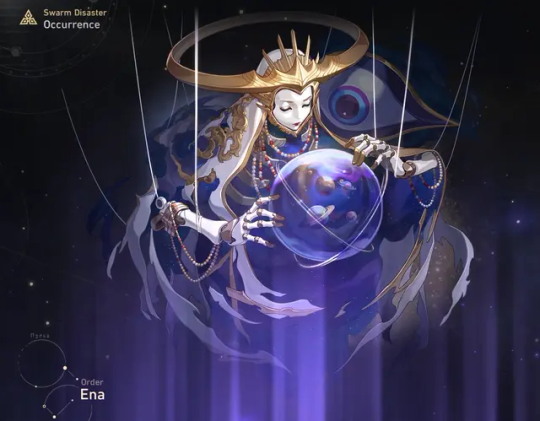
But... this is not how humanity has always defined "Order."
It was not always taken for granted that people had the power of self-determination, and in fact, for many centuries and across many cultures, the concept of "the order of the world" was tied directly to the concept of destiny. Whether a volcano would explode and destroy your entire civilization, whether floods would swallow your city, whether the crops would grow or fail all depended on the pre-made decisions of supernatural powers, who were in turn often personified concepts of the natural world itself. What happened to any given individual, what twists and turns their life would take, whether they would achieve their dreams or not--all these aspects were also predetermined, decided not by the actions of the individual but by fate itself.
Thus, the world and everything in it has a natural order. Things may seem chaotic, they may even seem unbelievably horrible, but all events in existence unfold as they should. We may not understand why, but everything occurs in due course, woven into an endlessly repeating pattern on the fates' loom--spring becomes summer, life becomes death, disasters happen and are healed from, children are born and grow old. If it is your fate to die, you will. If it is your fate to fight and live, you will. To reject this natural order would be as futile as telling the sun not to rise.
The words "order" and "ordained" have the same origin.
Enter Gaiathra. First of all, she is the Star Rail equivalent of a pagan goddess--her worship exists separate of the confirmed existence of aeons, by an uncontacted and non-space-faring race. Even her description, being triple-eyed, evokes other "triple goddess" figures across history, both in modern interpretations (the triple goddess of Neopaganism) and in ancient mythologies (the three fates of Greece, the Tridevi of Hindu culture, etc.).

She is strongly associated with the natural world: The planet of Sigonia is said to be a manifestation of her very body, the rain is her blessing and acknowledgment, and she goes through a yearly cycle of death and rebirth (calling the cycle of the seasons to mind). She is said to be a goddess of both fertility and travel (likely in the sense of nomadic wandering by the time Aventurine was born). Avgin worship of the goddess manifests in the form of sacrificial cyclic knots.
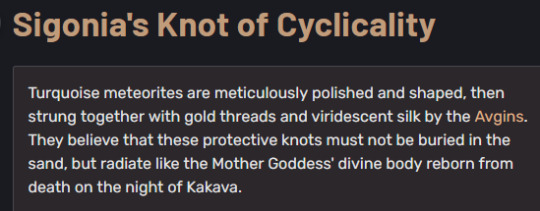
Which might call to mind another pagan culture well-known for their cyclic knots: the Celts, whose famous Celtic knots represent cycles of eternity, unity, and the interconnected nature of life itself.
The Avgin prayer to Gaiathra focuses on elements of a person's life that all might be determined by "fate"--will your blood keep flowing, will your journey be peaceful, will your schemes stay hidden? It hopes that things will be as they should, that the future ahead of you is predetermined to be a good one, and that the cycle of life decided by the goddess will be in one's favor.
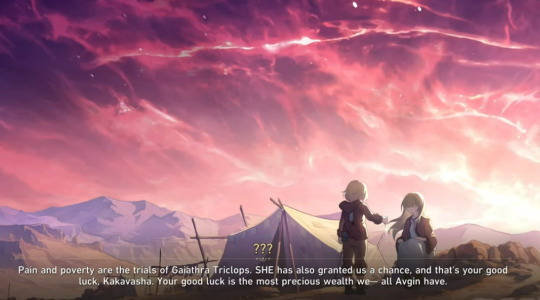
But while the Avgin hope for good things, they also strongly espouse embracing the reality of one's life, with suffering and hardships seen as manifestations of fate that should be accepted as facts of life. It is said that any society blessed by the Order ultimately falls--is it not the natural fate of all societies to one day fall? For mankind to return to the dust and be reborn anew?
Whatever will be, will be.
There is a reason--a logic--an order--to everything that happens.
I hope you can see where I'm going with this: While Sunday and Ena represent the concept of "Order" as a result of self-determination, a power "the strong" can wield to overcome the inherent chaos of reality, Aventurine and Gaiathra represent a different, older concept of "Order" (I can't help but see the entirely separate eye lurking behind Ena?): existence is not inherently chaotic but instead is foreordained, following endless orderly cycles life and death, weal and woe, rise and fall.
PHEW! Okay, so all of that to say Aventurine and Sunday make perfect parallels through a mirror darkly, even when it comes to the blessings they've been granted: One imposes order from on high; one continually rolls the dice despite knowing the inevitable outcome.
Both of their stories are entirely intertwined with the concept of fate, whether by opposing it...
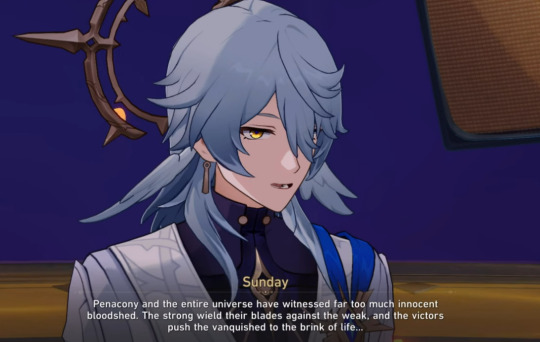
Or accepting it.

And even at the end of Penacony, we leave both Sunday and Aventurine in precarious positions. Aventurine, while ostensibly "victorious," faces another roll of the dice immediately after Penacony, when his future as a Stoneheart is called into question. Yet "fate" comes through for him again--his bet, as always, comes true. His future isn't in question--it is the question itself. What's next? He finally wants to live to find out.
Sunday, meanwhile, ends Penacony's arc in a truly difficult place. He's virtually exiled from the only home he's ever known, a flightless bird tossed out of his cage into cold hard reality. He has to find an entirely new way forward and may even be forced to reckon with an entirely new definition of "Order" itself.
The parallels between these two characters are entirely intentional and very, very blatant, and I am exceedingly interested in seeing whether their paths diverge or continue to reflect similar fates moving forward.
So uhhh... that's what I think of Sunday? 😂
#honkai star rail#aventurine#sunday hsr#gaiathra#ena the order#character analysis#hsr meta#listen#these two characters have so many parallels and obvious comparisons#like I didn't even bother to get into the bird imagery#Sunday is the Aventurine who didn't lose his sister#and didn't have to deal with the thought of being an entirely failed chosen one#until recently#AND NOW HE IS#because they're pretty much the same character into two different shades lol#which I do think is interesting#because people love and empathize with Aventurine so easily#while way more people struggle with seeing Sunday as a victim
189 notes
·
View notes
Note
Thought about your comment on how danill just seems to dislike most of the utopians and made me think about how the bounds Daniil gets along with most are related to the humbles. There’s something very interesting in that.
i've noticed that as well. daniil has a straight-up distaste for most of his bound. or, skeptical might be a better-suited word. he can tell mark he wishes he could kill him. he can literally offer vlad the younger to be cannibalized. even with eva i think any affection for her is posthumous and comes from a place of regret and guilt above all else. he finds the kains crazy and deluded, admits he will never understand them and even if he does choose the utopian ending to me he does so with reluctance and regret.
with the stamatins i think it's a bit different, given he views them as these genuinely bright minds with the capacity to conceive and produce miracles (and even then he has dialogue options where he can call peter a drunk and andrey a maniac and stuff like that). he does like them best but i think it comes purely from a rational standpoint of them being creative/skilled etc. and him appreciating those traits in a person
as for his involvement with the humbles, i think his connections to them are very interesting. yulia, anna and lara come up A LOT in the bachelor's route, i think he meets all three on his first or second day there and they show up in at least 2-3 quests each after that. aspity too, and well also saburov since they're technically working together. even clara herself is closer to him in at least 2 of the 3 routes than with artemy.
thematically i don't know what this could signify since the ideology of humility is the polar opposite of some of his core ideals. like the humbles believe their evil will be absolved through death, while daniil specifically has a line (which i cannot find right now so you'll have to take my word for it) which claims that humanity is worth preserving even if it is/produces evil. so exactly polar opposites.
side note: clara does not like her bound either 😭 i think she genuinely does see them all as evil sinners who need to be purified through death. she also tells artemy she's jealous that his bound are children and wishes her bound were 'like that' too.
86 notes
·
View notes
Note
What does the sorting hat consider to put someone in a house? Like we know it considers their wish but what else? Some theories say that it puts them according to what they value, like Hermione valued bravery more than intelligence and hence gryffindor.
What's your take on it?
I think it's a combination of a few things. It's your traits, values, aspirations, wants (but not in the way most think), and motivations. It's kind of all mixed up together into a sorting.
Like, I think house sorting is just a more complex decision than just traits, so everyone has at least some attributes that fit other houses.
Because of that, usually when I sort characters from other media, I say shit like "Gryffindor with Hufflepuff tendencies" for characters who are Gryffindors, but have certain Hufflepuff traits and behaviors. Or I say "Slytherin with Ravenclaw as the runner-up" for characters who are Slytherins but could also fit in Ravenclaw, and there is one specific character aspect that gives Slytherin the edge.
As I mentioned, I think the sorting hat takes a lot of things into account together, and since we're not a magical sentient hat, I have a small list of the sort of questions I usually ask to get to what I believe a character's core characteristics and values are — and therefore, the sorting the hat would give them.
We'll use the Golden Trio for this example as while they're all Gryffindors, they are not Gryffindors for the same reasons.
Now, traits, are something situational. The same person could behave very differently under different circumstances. Becouse of that, I don't find looking at a list of traits useful to get the actual core traits of a character (which I think is one of the things that goes into sorting). So, instead, I ask questions about character traits under specific circumstances. I find these sorts of questions help get down to the core traits and values that make a character better.
(Also, there are certain traits that fit more than one house. Like determination, which is both Slytherin and Gryffindor, depending on context. Or loyalty, which is both Gryffindor and Hufflepuff, depending on context (but can also be Slytherin under some circomstances). Or cleverness, which is both Ravenclaw and Slytherin, depending on context. It's all about how the trait is applied in a given situation, hence why I like my method of thinking about sorting)
1. Problem Solving - what is the go-to method of said character to solve problems in a situation that isn't a life-and-death threat. Both without a time limit and on a time crunch.
And we'll look at our trio:
Harry's go-to is lying and cunning. He lies to Peeves when he catches him he lies to McGonagall when she catches him, he tricks Ron into thinking he drank Felix Felicis, etc. Harry is very cunning and when he needs to problem solve when the threat of death isn't looming over him, even under a time crunch. Harry's response when standing up to defend his friends from Malfoy, is usually all witty remarks and sassy comebacks. When Umbridge forces him to use a blood quill, Harry is too prideful (and spitefull) to show her pain, because that would be losing and her getting what she wants, so he responds by acting indifferent. So for this category, Harry gets two points for Slytherin.
Hermione is interesting in the problem-solving category, when she has time, she likes to plan ahead and research. When Buckpeak is put on trial or she decides she wants to free House Elves, her first stop is the library for research. Hermione comes up with clever magical solutions she researches and then executes like with the D.A. coins and D.A. names scroll jinx. Or she plans schemes of blackmail ahead of time. All this gives a point to Ravenclaw. Her tendency towards blackmail and cheating though, should be noted as a Slytherin point.
However, we see Hermione problem-solving in another way. The Rita Skeeter example. While Rita's threat isn't life-and-death and therefore counted in this category, Hermione had to act on a time crunch. Harry, when put on a time limit, still solves problems with cunning, but Hermione, on a time limit, can't do her usual planning and research, there's no time. So when Hermione needs to solve something fast, she becomes reckless, impulsive, and tends to take big risks. Capturing Rita in a jar is an example of Hermione seeing a chance to deal with Rita and impulsively taking it without thinking ahead much. So Hermione also gets a point to Gryffindor in this category.
Ron's problem-solving methods, when he offers them, are efficient and pragmatic. He's a chess player, and if he has a moment to consider it, he'd come up with a practical, effective, and not necessarily moral solution giving Ron a point toward Slytherin.
Ron also gets a point toward Gryffindor in this category though. The reason is that he often doesn't offer cunning solutions but instead acts immediately without thinking, especially when it comes to defending people he cares about (even when the threat isn't life-threatening). So, while he has the capacity for cunning, he more often than not, doesn't employ it, especially under a time crunch.
2. Problem-solving under threat of death - when the situation gets really dangerous, how do they deal with it?
Luckily, we get plenty of examples with our trio:
Harry here gets points for two houses like Hermione in the last section. In the DoM and even in the Graveyard, Harry is always trying to plan. Trying to find a clever way to get out and to escape. He keeps Lucius talking in the ministry to buy him time to think of a plan. All in all, very Slytherin of him.
But Harry has another thing he does under immense threat, and that's stand up and fight. His resilience is one of his most defining character traits. His ability to stand after being tortured and shout at the Dark Lord that he will not bow. Yes, there's some Slytherin pride there, but it is an act of courage, which gives him a point towards Gryffindor.
Hermione is simpler in this category. When shit is dangerous, she gets brave and impulsive. In OotP, when Umbridge is about to torture Harry, Hermione leads her to Gwamp. It wasn't because she knew what she was doing. She didn't plan it through at all. She just wanted to make sure Harry won't get hurt. She set Snape's robes on fire in first year for the same reason. It was the first thing that came to her mind. Hence, why she gets Gryffindor in this category.
Ron, is also a Gryffindor when shit hits the fan. He is ready to throw himself in front of Bellatrix and Aragog if it means saving Hermione. He stands up on a broken leg to face who he thinks is a crazy murderer who's after Harry. Ron is incredibly brave and impulsive when in danger, giving a point to Gryffindor.
3. What they aspire for - what do they want to accomplish for themselves. Be I an ambition towards a job or something they want to just be better at.
Harry's aspirations are very simple. He wants to be normal, well-liked, but not important. And hopefully, live to adulthood. He wants to be just Harry. He wants to have friends and be safe - all very much Hufflepuff aspirations. He doesn't seek glory the way of a Gryffindor or a Slytherin, so he's getting this point to Hufflepuff.
Hermione's aspirations are more glory-seeking. She wants to be the best at things. She wants to be known as the smartest in the room. Even when it comes to freeing house elves, yes, she feels compassion for them, but she also wants everyone to know she's compassionate. Which pushes her towards Gryffindor and Slytherin. I see her as more of a Gryffindor in this category due to her aspirations being two-fold and motivated by both glory and righteousness.
Ron is a Slytherin when it comes to personal aspirations. He wants personal success and personal glory without any of the righteous veneers Hermione has. He wants to carve a place for himself to feel special and unique and better. We see this in the mirror of Erised in 1st year and in his fits of jealousy throughout the books.
4. Motivations - why do they do the things they do? What gets them up in the morning?
Harry does things out of a sense of duty and responsibility. He saves people because he feels responsible for it. He feels that if he doesn't do it, no one else will. This sense of duty and responsibility is a chivalrous trait and places Harry solidly in Gryffindor for this category.
Hermione does things due to her strong sense of justice. Hermione likes it when things are right and just. This pushes her to either Gryffindor or Hufflepuff. In Hermione’s case, though, I'd say it's more a Gryffindor's sense of righteousness and justice rather than a Hufflepuff one due to her not being necessarily interested in "fairness". (She does cheat quite a bit if it's towards a goal she thinks is just. Even if it's just getting Ron on the Quidditch team).
Ron does things out of a sense of loyalty. He isn't going to help someone he doesn't care about, but for the people he does care for, he'd move heaven and earth. This, to me, gives him a point towards Slytherin. Becouse this kind of loyalty that is selective and very unconcerned for people outside the group he's loyal to, is a Slytherin kind of loyalty.
5. Defining trait - if you need to choose one trait to define them, what would it be?
Harry - Resilience. His force of will, ability to survive, and strength to keep going are Harry's most defining traits. This is a Gryffindor trait, giving the lion's house another point.
Hermione - Determination. Hermione does what she thinks is best to achieve her goals. If she needed to study, she'd study, she'd act, she'd do it. But she won't do anything. Hermione, as I mentioned, has a strong sense of justice, and while she can be very feral, I can't see her being willing to kill if there's another way. She is very convinced of her morals, which pushes this determination towards a point for Gryffindor and not Slytherin.
Ron - Loyalty. Ron’s motivations are usually ones of loyalty. His most defining moments are standing up for his friends, and defending Harry, Hermione, and his family to his dying breath if he has to. which is a point for either Gryffindor or Hufflepuff. Since Ron's sort of loyalty is, as I said, one that often manifests in protectiveness and disregard for his own safety, I'll give this point to Gryffindor.
6. Valued trait - if they had to pick their favorite trait about themselves, what would they pick?
Harry doesn't really have a favorite trait of his that is his. This is the kid that when Barty/Moody asked him what his strengths are, he said he didn't have any. Harry is way too humble. He has no idea how special, talented, and capable he actually is. This tendency to undersell himself and underestimate himself is one I associate with Hufflepuff.
Hermione, I think, appreciates her bravery more than her intelligence. Yes, she's smart, and she's good at memorizing books, but it isn't what she values most about herself. She doesn't really see it as something noteworthy the way characters in Ravenclaw (like Terry Boot) see it. So, she gets another point to Gryffindor.
Ron, like Harry, has a lot of insecurities (many unwarranted). But Ron does know he has strengths. He knows he's good at chess. He knows he's good at strategy even if he thinks very lowly of himself in other aspects. Which gives him another Slytherin point.
7. Values - what traits do they completely despise in others? What traits do they appreciate in others?
Harry despises authority figures. He chafes under people, telling him what to do. He hates going by the book. He hates bullies who lord themselves over others because they think they're better or know better, and figures like Fudge, Umbridge, and Scrimgoure are just bullies to him. This gives him a point toward Gryffindor.
He appreciates a lot of traits in others, actually. But I'll say he appreciates honesty and friendship more than other things. Someone willing to stand in his corner is what Harry wants the most. So, this gives him another point for Hufflepuff.
Hermione despises unjust people. People who abuse their power, people who are cruel for no reason. People who tell lies for their own personal gain. Which gives a point toward Gryffindor.
In terms of what she appreciates, she appreciates intelligence and competence in authority figures, such as Dumbledore or Lupin. But she also really looks up to Harry's courage, intuition, and righteousness and often sees that as more important. So I give her a point toward Gryffindor.
Ron hates stuck-ups and pretentiousness. We see it a lot, both with Percy, and Hermione in first year. One of the things that makes him like Harry instantly on the train is seeing this super famous, rich kid, who is completely down to earth and normal. This gives Ron a point toward Hufflepuff.
In terms of what he appreciates in others, Ron is repeatedly impressed with Hermione's intelligence and tendency to plan ahead, more than she is for sure. But I think Ron appreciates Hermione's impulsive acts of bravery more. I think Ron really does appreciate bravery, courage, and risk-taking. So I'd give him one point to Ravenclaw and one point to Gryffindor.
8. And finally, which house do they want?
Now, I actually have a bit of an uncommon idea of how this question works. You see, I don't think the hat always listens to what a student wants. I think what a student thinks they want and why just says a lot about their values. In Harry's case, it illustrated that his values align with Gryffindor, but it isn't always the case, and I don't think every student gets what they want in terms of sorting. (Case and point, Neville, who was scared of Gryffindor's reputation and asked not to be there and still got Gryffindor).
Harry asked not to be in Slytherin, he didn't ask to be in Gryffindor. He asked not to be in Slytherin because all he knew of the house was that it was the house of Voldemort and dark wizards and bullies like Draco. Harry's choice of not Slytherin was Harry desperately not wanting to think of himself as evil. It's not what the house stands for, but that's what Harry's request was about. Him asking: "not Slytherin" for the reasons he did, is Harry asking: "let me be good enough". This pushes him towards either Hufflepuff or Gryffindor. Except, a Hufflepuff I think wouldn't have asked in this way, before the hat made any indication toward Slytherin, and therefore it is a point to Gryffindor.
Hermione was told Gryffindor is the best. She comes to Hogwarts thinking Gryffindor is where all the heroes and best wizards are at, and she wants to be that. As I mentioned, Hermione does seek personal glory in the aid of others. She wants to be heroic and brave and a savior. This reasoning to ask for Gryffindor is a Gryffindor reasoning, but it's also a Slytherin one. So I gave her points for both.
Ron's entire immediate family are Gryffindors, and he's desperate to fit in with them and not be lesser. He probably begged the hat to be on Gryffindor. Which, actually, is a Gryffindor move. Again, this desire to be more is one that pushes him towards Gryffindor and Slytherin. But when you add to that him begging (something typical Slytherin pride wouldn't allow), it is a Gryffindor point.
Tallying up the score
Harry: G - 5, S - 4, H - 3, R - 0
Hermione: G - 9, S - 2, H - 0, R - 1
Ron: G - 6, S - 4, H - 1, R - 1
With this, I'd call Harry a "Gryffindor with a Slytherin runner-up", Hermione a "true Gryffindor", and Ron a "Gryffindor with Slytherin tendencies".
What I like about this, is that even though I had very different answers for each and a different amount of points per question depending on multiple variables — they are still all Gryffindors. And I really do consider Hermione the "truest Gryffindor" in the trio, so, it didn't really surprise me.
I will note that sometimes I don't really need all these questions, and sometimes I add more questions if I feel I didn't really get to the bottom of a character, but the above 8 questions usually lead me to when thinking about sorting since they tend to get to a person's house well, I think. Like, these are the sorts of questions I think are better to ask than to just look at a list of traits. I think these questions are closer to what the hat is looking for when it comes to sorting too.
#harry potter#hp#hp meta#hollowedtheory#asks#anonymous#harry potter meta#sorting hat#house sorting#golden trio#harry james potter#hermione granger#ron weasley
80 notes
·
View notes
Text
He Walks: Dick Grayson, the Survivor
This is a meta written for the ten year celebration of Grayson. For @grayson10yearslater.
From it’s prologue in Nightwing #30, Grayson by Tom King and Tim Seeley, boldly poses its readers with the question of how to describe one of DC’s oldest and most iconic characters when he is stripped of his familiar superhero identities. Who is Dick Grayson when he can’t hide behind Robin? Nightwing? Batman?

[King, Tom; Seeley, Tim; Tynion IV, James, writers. Janin, Mikel; Hetrick, Meghan; Garron, Javier; Lucas Jorge, illustrators. Setting Son. Nightwing. 30, e-book ed. DC Comics, 2014. Page 30]
Divided into twenty issues and three annuals, the story explores the theme of identity from all angles, pushing Dick away from his comforts to dissect the different layers of his character. A hero, the end of the last issue seems to say, is the true answer to this difficult question.
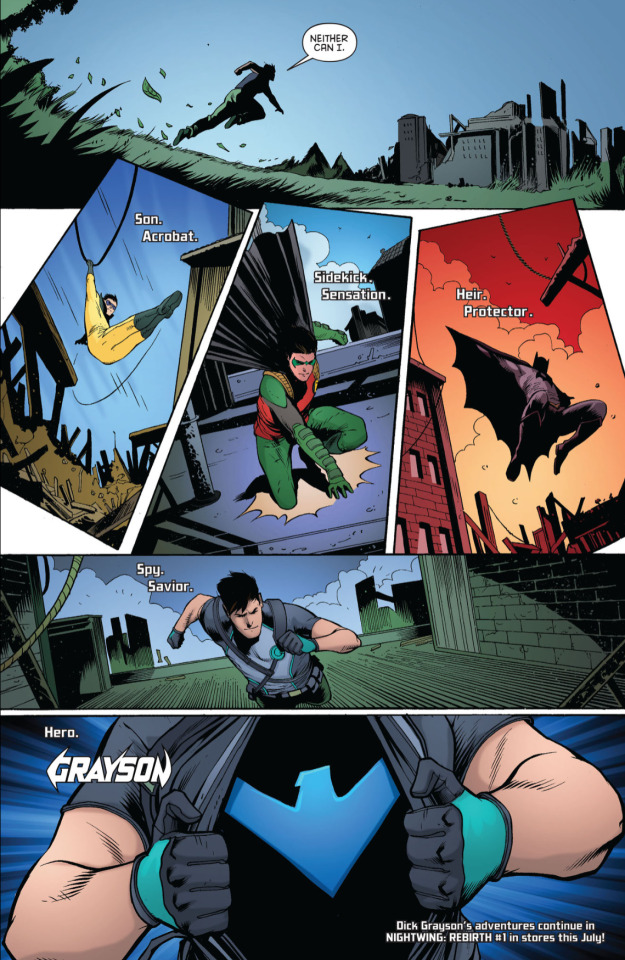
[King, Tom; Seeley, Tim, writers. Antonio, Roge, illustrator. Spiral’s End. Grayson. 20, e-book ed. DC Comics, 2016. Page 23]
And while that is undoubtedly true, each of the preceding nineteen issues elaborate on what traits can folded into a hero.
Dick is a storytelling, the first annual says;
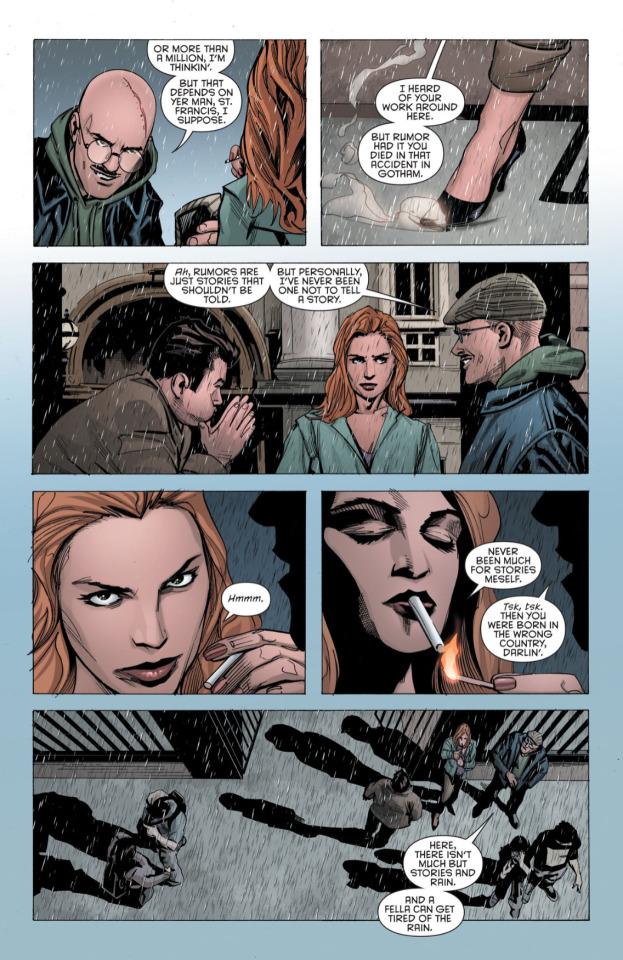
[King, Tom; Seeley, Tim, writers. Mooney, Stephen, illustrator. A Story of Giants Big and Small. Grayson. Annual 01, e-book ed. DC Comics, 2014. Page 11]
Dick is compassionate, the finale of Act I with the Paragon Brain proves;

[King, Tom; Seeley, Tim, writers. Mooney, Stephen, illustrator. Sin by Silence. Grayson. 07, e-book ed. DC Comics, 2014. Page 19]
Dick is a partner.


[King, Tom; Seeley, Tim, writers. Janin, Mikel, illustrator. Nemesis Part Two. Grayson. 10, e-book ed. DC Comics, 2014. Pages 23 to 24]
I want to focus a little bit on that last one. Dick, after all, was created to be the perfect partner. In 1940, he was the sensational character find that became Batman’s other half, the missing element to his mythos. Move further along his history, and a diverse number of writers were compelled to team Dick with other characters — he’s the Titans’ leader, the missing third piece of the World’s Finest, Batgirl’s love interest.
Grayson, too, is interested in exploring this aspect of Dick Grayson. In its first act, it pairs him up with Helena Bertinelli, whose more experience, tragic background, and darker personality is meant to mirror Batman.
Tom King: For me, it seems to make so much sense because basically she almost has that Batman female origin. She shares that origin that Batman and Dick have of having gone through this violent period when she was young and coming out of that a hero. We wanted to play with that. We wanted to play with the dichotomy of what Barbara is in Dick's life versus what Helena is in Dick's life. Helena's much closer to what Batman is and much closer to the father figure Dick was related to, so I think that creates immediate tension and fun stuff we can play with.
[Katzman, Gregg. "Interview: Tom King & Tim Seeley Talk GRAYSON." Yahoo! News, 4 Jan. 2015. Accessed 8 Dec. 2024.]
In act two, he is paired up with Tiger King of Kandahar. In fact, there is a theme of duality and partnerships throughout Grayson, showing that this is a critical aspect of who is Dick Grayson.
The exception to this is Grayson #05.
A self-contained story, Grayson #05 isolates Dick to get to the core of who he is. By contrasting Dick with Helena and Midnighter, placing him in the unforgiving vastness of an infernal desert, and calling forth the tale of Robin Dies at Dawn, Grayson #05 presents us with a man who does not give up and does not give in. Dick walks, even if he must walk, at times, alone. When laid bare, without the trappings of a superhero identity or of a partner, Dick Grayson, Grayson #05 says, is, at the core of his being, a survivor.
In this meta, I want to see just exactly how Grayson #05 does that through a close reading of the issue.
Now, without any further delay, let’s get started.
Let’s start with the cover.

[King, Tom; Seeley, Tim, writers. Janin, Mikel, illustrator. We All Die at Dawn. Grayson. 05, e-book ed. DC Comics, 2014]
Everything about this cover radiates heat. The sun is beaming down mercilessly, the spirals mimicking the sun rays, the color palette a strong orange that is highly saturated but not bright. The reader can feel how hot it is in this desert, and all around there's nothing but sand. Sand, sand everywhere the eyes can see, and in the center of the image, a lone black figure braving this infernal bare landscape.
This cover tells us not just the location of where the issue will be set, but it also shows that Dick will be alone out there. It tells us this will not be an action-filled story, but it will be one of survival. Man vs Nature, and nature does not discriminates with her ruthlessness. Dick stands alone facing the elements, but he stands. He is walking, he is not giving up. It would be so easy for this cover to have a close up of Dick's, Helena's, and Midnighter's exhausted expression as they each try to survive, but instead we just see Dick by himself, alone, walking. He does not give up, he does not give in. He survives.
The issue then opens in medias res, immediately presenting the readers with that main conflict: survival. It does not waste any time with unneeded exposition — after all, though Dick would hate this fact, we as readers do not need to know the name of the mother who is dying; we do not need to know the details of Minos’ mission before it all went wrong; we don’t even need to know how Midnighter managed to track Dick and Helena. All we need to know is that Dick and Helena, and Midnighter are all after the Paragon Heart, which belongs to the, as of this page, unborn baby; that ARGUS somehow tracked Midnighter who was fighting Dick for the Heart; and that mid-fight the mother went into labor.
There's an elegance in the way everything is conveyed so well and so quickly in this one page. It's brilliant storytelling from both a writing and a visual stand point.

[King, Tom; Seeley, Tim, writers. Janin, Mikel, illustrator. We All Die at Dawn. Grayson. 05, e-book ed. DC Comics, 2014. Page 01]
As they crash into the desert, the mother passes away. ARGUS is gone, but our trio and the newborn baby girl are faced with a mightier enemy: The desert. The nearest town is days away, they do not have a lot of supplies, they do not have how to call for help. Here, we’re faced with this issue’s main question: Can they survive this? The answer seems to be resounding “no.”
Let’s take a look at how each of the characters approach this situation.
Helena is pragmatic. She is thinking of the mission, but her expression is troubled. She doesn't see a way out of this. She knows they have to survive long enough for Spyral to eventually find them, but the odds are against them. Given the fact she’s injured, it’s unlikely she’ll ever make it out of this desert. Still, that does not mean she’ll fall into despair. She'll do what needs to be done, but she knows this is not something they can easily get out of. If she goes down, she'll go down fighting. Like I said, she’s pragmatic.
Midnighter, on the other hand, is a pessimist. He is jaded. Why bother trying? Midnighter is a nihilist. “We’re dead,” he says not once, but twice.
Then we have Dick. Beautiful Dick, he holds the baby in his arm like she's the most precious thing in the world. And in this moment, she is. His reply to Midnighter is telling. They aren’t dead. They can't be, because if they are dead, then so is she, so death is not an option. It's not a question of what is practical, of what the mission is, of what the odds are. It's not about being an optimist, either. It's simply about her. She is all that matters and she is entirely dependent on them, so they can't be dead. They cannot let her die, this little innocent child who is not even an hour old. So what will they do instead? They’ll walk. They’ll survive.

[King, Tom; Seeley, Tim, writers. Janin, Mikel, illustrator. We All Die at Dawn. Grayson. 05, e-book ed. DC Comics, 2014 Page 02-03]
The next page displays what will become the brilliant standard for this issue — open skies, sand, and small figures walking. Everything about it conveys this vastness that is so oppressive in its openness. It's the majesty of Mother Nature.
Note how tiny the figures are. Note how Dick leads the other two, not by a little, but by a lot. In his arms Dick holds the baby, nurses her with the formula from the mother’s bag. In the pages we see Helena struggling, Midnighter drinking water and shedding away his clothes, but Dick remains stoic. He leads, separated — isolated, distant — from the rest, determined, disappearing into the far orange of the page.
In this, we see Dick’s silent determination. It’s notable that he is not trying to make light of the situation through humor. Instead, he is silent. And he walks.
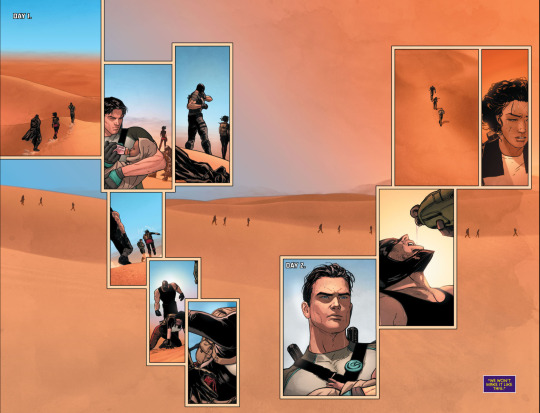
[King, Tom; Seeley, Tim, writers. Janin, Mikel, illustrator. We All Die at Dawn. Grayson. 05, e-book ed. DC Comics, 2014. Pages 04-05]
As the story continues, Midnighter’s pessimism deepens. It is notable that this issue is the first time Dick and Midnighter have seen each other since Grayson #01. And what does Midnighter do? He lashes out at Dick by revealing he knows who Dick is. This calls back to Forever Evil, where Dick’s identity was revealed to the world. Midnighter is weaponizing Dick’s trauma against him, trying to draw a reaction out of Dick. Not only that, he says that they only way to survive is to kill the baby and use the Paragon Heart. Otherwise, the odds are not in their favor, and he deems this "just walk" strategy is pointless. This is how Midnighter copes with the hopelessness of their situation — he dwells on the negative and lashes out.
Helena reacts to Midnighter by subduing the threat, but she doesn’t comment on his defeatist attitude. Nor on his plan. She is, again, practical. She won’t say they’ll make it, but she won’t allow Midnighter to pose a threat to the mission.
Dick, though… Not once does Dick acknowledge Midnighter’s taunting. Not once, not even to defend the baby. A weaker writer would have tried to get Dick to empathize with Midnighter, to tell him again that they're not dead yet, that they just need to keep trying. Instead, Dick’s refusal to even look at Midnighter shows how he won't even acknowledge the possibility of not surviving. His focus, instead, is all on her. That is what is driving him so that is what has his entire attention. Midnighter's temper tantrum is not even worth his time. Not when her survival is at stake.
I also want to take a moment to take in the environment. In this scene, the first panel shows how tiny the three of them are in the vast desert, the beautiful sky expanding above them. Mother Nature, the issue seems to say, is beautiful, worthy of awe. It is big, bigger than any human. More powerful, too. It is a challenge unlike any Dick has ever or will ever face. It cannot be charmed by him, it cannot be fought against, it cannot be conquered. It is not cruel or evil, either. It simply is, bare and uncomplicated, honest at all times. To survive her, Dick must also be the barest, least complicated version of his self.
While writing this, I often felt myself hesitating when writing about the conflict between Dick and desert. Phrases like “go against the desert,” often came to my tongue, and I had to swallow them back due to how wrong they felt. To “go against” someone (or something) is to have an antagonistic, adversarial relationship, and I’m not sure that is incredibly accurate to this scenario. The desert is indifferent towards Dick and the others. Midnighter speaks of fighting, of winning, of conquering this challenge, but Dick, by contrast, is quiet. He is not trying to “win” against the desert. That is not the right frame of mind. Rather, he is simply trying to survive.
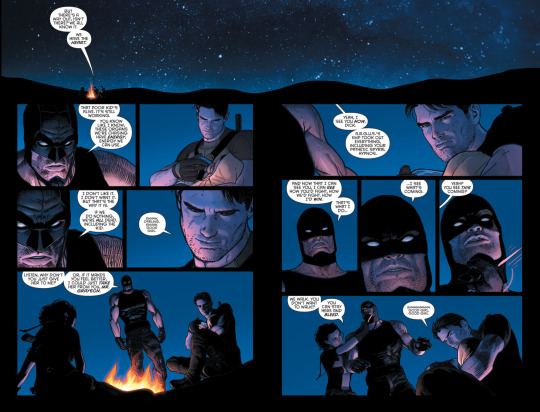
[King, Tom; Seeley, Tim, writers. Janin, Mikel, illustrator. We All Die at Dawn. Grayson. 05, e-book ed. DC Comics, 2014. Pages 06 - 07]
As time passes, Midnighter continues to talk. To taunt. His negative attitude doesn’t light up, and he is still trying to get a reaction out of Dick. Here we see that Midnighter is perhaps not fully comfortable with his enhancements, like he doesn't see himself as fully human because of them. He resents them even as he trusts his enhancements more than he trusts his own abilities. He says he sees all outcomes and there are none where they survive this. Not as humans. Not without the Heart.
Note how Midnighter presents their situation as not about being tough, but about how much energy you have. This framing seems to reject the idea of survival — of “toughing it out” — and instead looks at their situation as one of victory and defeat — you have to have enough energy to make it out of the desert, and in doing so, you’ll be victorious.
Yet, Midnighter predicts himself to outlast Dick, but in reality, he falls before Dick does. This begs the question: Was Midnighter right? Must you defeat the desert and win against it in order to win?
Personally, I believe the story is saying “no.” This is not about victory and defeat, but about survival. And to survive, one must lay themselves bare of foolish things such as pride and ego. To survive, you must dig deeper within yourself, and find something that will allow you to not go against mother nature, but to continue walking along side her.
Dick has found his something deep within himself. That something is his compassion. Helena collapses, and Dick leaves with her his shirt, laying himself bare. Yet, despite his fallen partner, his priority is still the baby girl. He will survive for her, and in this action we see the depths of Dick’s compassion for others. He continues to walk. He continues to survive.
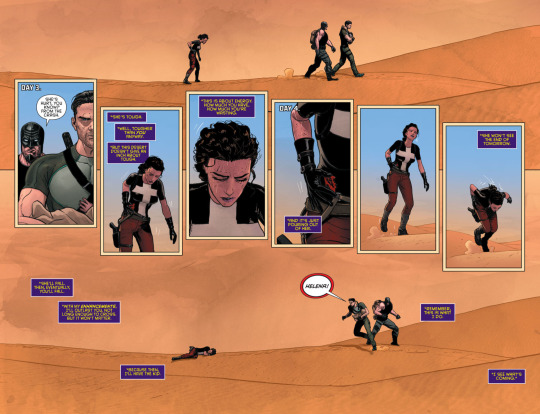

[King, Tom; Seeley, Tim, writers. Janin, Mikel, illustrator. We All Die at Dawn. Grayson. 05, e-book ed. DC Comics, 2014. Pages 08-10]
Finally, after days, Midnighter is confronted with the true force that is Dick Grayson. He was so certain he was going to outlast Dick. “I have… My… Enhancements. I have powers,” he struggles to say. But what does Dick have? How can a simple man continue to go against these conditions?
This page shows how deeply Midnighter underestimated Dick’s humanity and his compassion. Dick is not a superpowered individual, no, but Dick’s determination is unlike at other. This is who he is… Someone who walks.
Dick is a survivor. When Dick was a small boy, he lost his entire world in a traumatic act of violence. From the moment those ropes snapped and the Flying Graysons plunged to their deaths, Dick became a survivor — someone who had to figure out how to walk forward when everything seemed lost. And Dick did it.
If I can go on a bit of a tangent here, I’ll say that I really dislike whenever child heroes are characterized as child soldiers, be it by fans or by canon writers. This reading is, in my opinion, incredibly lazy and displays a lack of understanding of what superhero identities are meant to stand for. We can discuss the traumas that come along with being a child hero, but to dismiss it as a universally bad thing and equating to the real world horror of child soldiers ignores the fact that this is a fictional world in which the fantastical concepts act as metaphors for larger ideas.
Robin is not a child soldier. Robin, much like Batman, is a response to trauma. Specifically, Dick’s Robin is a response to the trauma of being a survivor of violent crime, and Robin demonstrates how a victim can regain agency and transform their tragedy into an empowering narrative. As Steve Braxi points out in his On Superman, Shootings, and the Reality of Superheroes essay, Batman “transform[s] trauma into will power,” and Dick, whose story is meant to mirror that of Bruce’s, does the exact same through Robin. Through Robin, Dick is able to not only find justice for his parents, but he is also to help other survivors like him. And that is what allows him to keep on walking.
This is what Grayson #05 demonstrates. It strips away the metaphor of the hero identities and the distraction of partnerships, laying Dick out bare and showing that as long as he can help someone, as long as he has his compassion, Dick Grayson can survive anything.
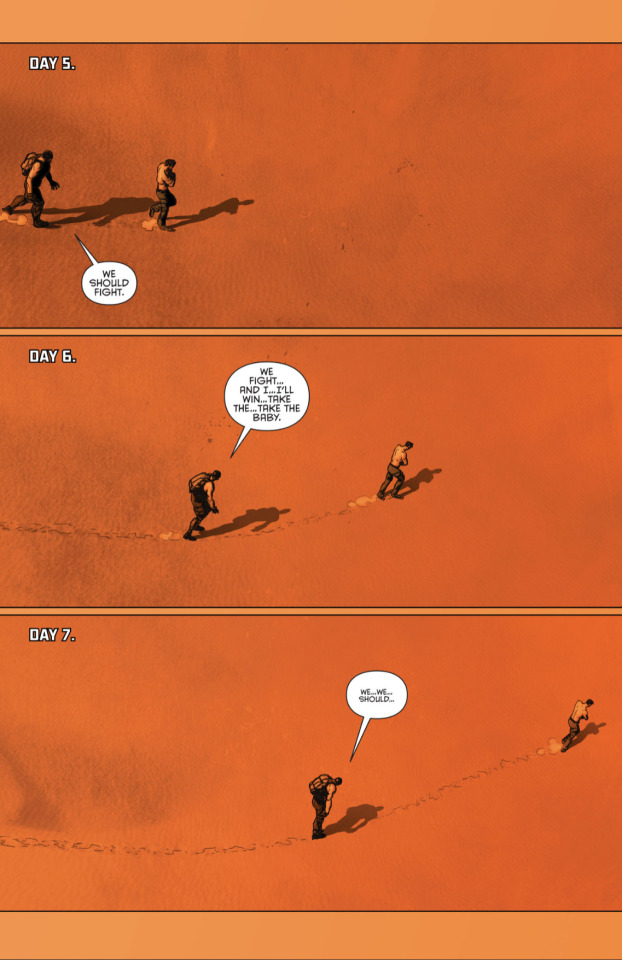

[King, Tom; Seeley, Tim, writers. Janin, Mikel, illustrator. We All Die at Dawn. Grayson. 05, e-book ed. DC Comics, 2014. Pages 12 - 13]
In the following page, the vastness of the desert is contrasted with close up shots of the baby. We see Dick, so impossibly small standing against a large desert that disappears into the horizon, and ocean of sand and oranges, and we see the whole reason why Dick is still alive. The environment that may kill him is contrasted with the reason why he will survive.
“I’m here. I’m here,” Dick tells the baby girl as she ceases her cries. “I’m still here.”
He gets up… And he walks. The repetitiveness of the action throughout the issue emphasizes the slog of the immediate aftermath of a traumatic event, those moments when you realize time is progressing forward as it always had, but your mind and heart are still stuck in that one moment that changed your life forever. All Dick can do is walk, walk, walk, yet he is still lost in this vast desert, the trauma is still overwhelming him, there’s no end in sight… But he does have his reason for not giving up — his compassion allows him to continue onward.

[King, Tom; Seeley, Tim, writers. Janin, Mikel, illustrator. We All Die at Dawn. Grayson. 05, e-book ed. DC Comics, 2014. Pages 14 - 15]
Robin Dies at Dawn is the title of Batman #156. In this two part story Batman finds himself in an alien planet filled with threats. Robin saves him from sentient, walking plants, and after escaping, they find a giant stone idol that comes to life and begins chasing them. They manage to leap over a deep fissure and realize that if the stone idol were to do the same, the unstable down would crumble and the stone idol would fall, securing their safety. As they wait for the idol, they see that it, too, realized the ground was unstable and it tries to figure out a safer passage to the other side. That’s when Robin provokes the stone idol, who, in fury, grabs a boulder to throw at Robin. Before it can do it, the floor crumbles and it falls, but boulder still hits Robin and kills him. Later, it is revealed that this was a hallucination induced by an experiment Batman subjected himself to meant to study the effects of loneliness in astronauts. Through the following days, Bruce has occasional hallucinations of alien creatures putting Dick in danger. It isn’t until Dick’s life is threatened by the Gorilla Gang that Bruce is able to “overcome” the lingering effects of the experiment, the threat to Dick’s life being enough to “shock” him back to normal.

[Finger, Bill; Boltinoff, Henry; Schiff, Jack, writers. Moldoff, Sheldon; Boltinoff, Henry, illustrators. Robin Dies at Dawn. Batman. 156, e-book ed. DC Comics, 1963. Page]
To the baby girl, Dick recounts this Golden Age story as if it were a dream, focusing on the part where the stone idol kills him with the boulder. In this tale, we go back to Robin, Dick’s first survival mechanism, and to the first person who first showed him compassion and to whom his survival was paramount — Batman.
Though so far Dick has rejected the idea of victory vs defeat, he presents the baby with a scenario where he is faced with such a conflict. Yet, in this case, to “go up against” the enemy is to call them forward so they will fall. Dick’s taunting leads the stone idol to it’s defeat, and this is the point which Dick says he wants the baby girl to focus on. You must welcome danger, he seems to say, and face it head on. You must walk forward instead of running away.
Yet, it is notable that the enemy is not the only one who is defeated in this story. After all, Dick “dies” at dawn. This is what Dick doesn’t want the baby to focus on, but I think it’s important in understanding this idea of survival. In the story, Dick sacrifices himself so Batman can escape. He goes up against an enemy, he achieves victory, but he does not survive. But, crucially important, Batman does.
This paints a picture where Dick's survival and his victory are not one and the same. Not the way Midnighter seemed to have believed. While Dick’s compassion is intrinsically tied to his status as a survivor of violence, this story seems to indicate that Dick will readily relinquish his own survival for the sake of someone else. In the framing of victories and defeats, other people’s safety -- other people's survival -- is Dick’s “win” condition.
This, I believe, demonstrates how Dick's compassion allows him to pass own his survivor status to others, even at the cost of his own life. By shielding them and giving them the opportunity to move past a trauma, Dick creates other survivors. He becomes their protector, their patron saint.

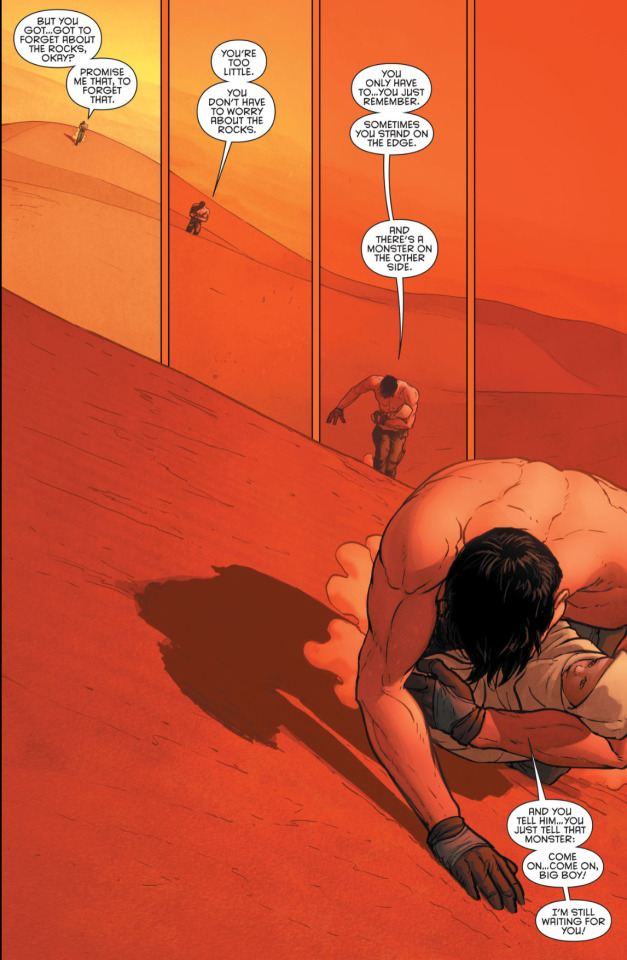
[King, Tom; Seeley, Tim, writers. Janin, Mikel, illustrator. We All Die at Dawn. Grayson. 05, e-book ed. DC Comics, 2014. Pages 16 - 18]
Dick Grayson is a lot of things, and he has numerous qualities. He is a partner, a hero, and a friend; he’s good, he’s funny, and he’s brave. While all of those are important aspects of his character, they can also distract from one characteristic that is crucial to Dick’s genesis.
Before he was Agent 37, before he was Nightwing, before he was Robin, Dick was a survivor. Having survived violence, Dick used his compassion to transform his trauma into power. Grayson #05 isolates Dick from the world, putting him in a dangerous and revealing desert to expose his ability to survive through his compassion. This, the story says, is who Dick at the core of his being, when stripped away from the distractions of partnerships and superhero metaphors. This is who Dick Grayson is: He is a man who walks.
Bibliography:
Braxi, Steve, “On Superman, Shootings, and the Reality of Superheroes” Comics Bookcase, September 2021
Finger, Bill; Boltinoff, Henry; Schiff, Jack, writers. Moldoff, Sheldon; Boltinoff, Henry, illustrators. Robin Dies at Dawn. Batman. 156, e-book ed. DC Comics, 1963
Katzman, Gregg. "Interview: Tom King & Tim Seeley Talk GRAYSON." Yahoo! News, 4 Jan. 2015. Accessed 8 Dec. 2024
King, Tom; Seeley, Tim, writers. Janin, Mikel, illustrator. We All Die at Dawn. Grayson. 05, e-book ed. DC Comics, 2014
King, Tom; Seeley, Tim, writers. Mooney, Stephen, illustrator. A Story of Giants Big and Small. Grayson. Annual 01, e-book ed. DC Comics, 2014
King, Tom; Seeley, Tim, writers. Mooney, Stephen, illustrator. Sin by Silence. Grayson. 07, e-book ed. DC Comics, 2014
King, Tom; Seeley, Tim, writers. Janin, Mikel, illustrator. Nemesis Part Two. Grayson. 10, e-book ed. DC Comics, 2014
King, Tom; Seeley, Tim, writers. Antonio, Roge, illustrator. Spiral’s End. Grayson. 20, e-book ed. DC Comics, 2016
King, Tom; Seeley, Tim; Tynion IV, James, writers. Janin, Mikel; Hetrick, Meghan; Garron, Javier; Lucas Jorge, illustrators. Setting Son. Nightwing. 30, e-book ed. DC Comics, 2014
54 notes
·
View notes
Text
Lois Lane in the military? Not a bad idea after all

From Absolute Superman #2 (2024)
It's interesting how every time I find some aspect of Absolute Superman that I don't like Jason Aaron finds a way to counteract and show me that there is a reason why this world is not exactly as I wanted it to be in the first place, and it is usually because things are more interesting if you let them develop. There is a process to things, a growth, characters to evolve and make mistakes and change from them, learn new things and take a different turn. It's more fun if you're there for the journey and not for the instant gratification of getting what you want without any complication or conflict. At first I was afraid of reading a military Lois Lane, I'm personally very antagonistic to institutions that impose authority of any kind, and one of the reasons why I like Lois and Clark so much is the way they stand against these institutions by being journalists and working for the people (yes, in a very romanticized idea of journalism, but let us have this ok?). However I believe that what Jason Aaron is trying to do is showing Lois trajectory finding that her own ideas were misguided and that there's another way to see things. I believe he wants to show us her as a flawed and human character changing her mind and finding a new way outside of the violent and authoritarian institution she's been part of it, instead of giving us an already idealistic Lois Lane from the get go. This is a new universe after all and, although Lois character had several of her core traits already in display on the first golden age Superman comics, she changed quite a lot too, developing a maturity and a self-assurance she didn't have it at first. So it's only fair to give this Lois room for growing too, to let her become her own person in this different universe, and most of all, to trust artists to tell their stories
#lois lane#absolute superman#superman#absolute universe#dc all in#jason aaron#rafa sandoval#dc comics#dc#comics#reading log#comic panels#text#thoughts#wednesday spoilers
60 notes
·
View notes
Note
I was wondering your thoughts on sun square sun in synastry?
How to deal with Sun-Sun square in synastry?


In general, this square tells us about different personalities, approaches and ways of expressing themselves. Many establish that there may be a clash of egos and priorities. Personally, I consider it to be one of the easiest squares to deal with.
As for practical approaches, I can mention the following:
🤍Maintain an accepting and open environment: This is with the main reason of knowing the other better, understanding each other, allowing yourselves to express yourselves truly and communicate well in case of differences or disagreements. It is important that you work on making this relationship a space in which you work together and try to understand each other before jumping to judgment.
🤍Accept the other as they are: It is important to accept that the other person has a different views and approaches to life and the different areas of it. Instead of trying to change the other, it is better to respect and value these differences as part of the diversity that each person brings to the relationship.
🤍Look for common points: It can help to find areas where you can both agree, look for opinions or things in common that help you connect better as a couple/friends. Although there are differences, there are always aspects where we can find a middle ground.


Some aspects in astrology that can help with this are the following:
🩶The harmonious aspects between Sun-Moon make both feel comfortable with the presence of the other, coming to find these initial differences something attractive, striking or even interesting. They understand their differences more easily and make the other feel safe enough to be themselves without feeling judged. They feel attracted to the other and easily arouse the sympathy of the other.
🩶Similar to the previous one, the conjunction, trine, sextile or opposition between Moon-Moon makes you feel emotional comfort. They may have different personalities, but despite this, the other provides them comfort, security, attention and care. They have a facility for understanding each other at a core level and can easily intuit the needs of the other. They get along quite well and may have similarities in lifestyles, emotional needs or may find comfort in the same things.
🩶When the planets fall in their 7th or 5th houses, it is very likely that these differences will be what most attracts and likes each other. They may perceive the other as charming in their own way, they may have an innate ability to understand them and it is difficult for their different ways of acting or seeing things to harm the relationship. You can help each other consider perspectives you haven't considered before. In addition, these overlays indicate affinity and compatibility.
🩶Saturn aspecting Sun harmoniously causes a feeling of admiration, as well as loyalty and dedication to the relationship with the other. These aspects ensure that you do not back down with the other, that there is support and understanding between you as well as that willingness to work with the other. There is a deep respect for each other's personality regardless of the differences that arise, because they know how to appreciate and love each other's virtues.
🩶The positive aspects between Moon-Venus cause there to be a deep adoration between you, you feel happy and delighted with each other, you love the way in which the other expresses affection, love and in general emotions. They feel that the other shows genuine affection, mutual adoration is evident and they can awaken in each other the sweetest and most loving feelings. All this sweetness is not superficial, because they genuinely love every little thing about each other.
🩶The conjunction between Sun and the angles can be something in favor for this relationship. If it is conjunct the rising [1st house], both may have many similarities and approaches to life, as well as some traits in common, from the way they express themselves to behaviors. If it's conjunct the IC [4th house] you are likely to feel warmth, appreciation and comfort with the other, you will feel at home and you will feel familiar with some traits of the other person, there will be understanding and patience. The conjunction with the DSC [7th house] will cause intrigue and curiosity like the other, you will perceive the differences, yes, but that will draw you more to the other, you can see the other as a potential long-term partner and you will feel delighted with some traits of his personality. And, if it is conjunct with the MC [10th house], it is very likely that there is deep admiration and respect for the other, they may have common goals and aspirations, as well as ethics and values that allow them to find a middle ground. It is likely that there was even some attraction at the beginning and you caught each other's attention easily.
🩶If Mercury makes a conjunction, trine or sextile with Jupiter, both can learn a lot from each other and be curious about what makes them different. They can help each other see the world differently, they will share many things together and they will show each other new perspectives. They will feel attracted to the idea of being able to learn many new things from the other and thanks to the other.
🩶The aspects between Venus-Mercury can help them feel a strong intellectual attraction for the other, likewise, they can love the way in which the other communicates or expresses themselves. Communication will be fluid, they may have common interests and similar visions on topics related to relationships or love. Difficult conversations can be handled with more tact and understanding.
🩶The positive aspects between Saturn-Moon or Neptune mean that both can overcome obstacles of all kinds with ease. Their appreciation, devotion and empathy towards the other is so genuine that it drives them to work and strive to understand the other in their entirety, and not only that but that is even more reason to fall in love, adore or support the other. These aspects give durability to the relationship, as well as reliability and acceptance.
120 notes
·
View notes
Text
Furina and High-Masking Autism
A lot of people don’t know how to recognize high-masking autism because its presentation challenges many stereotypes about what autistic people are like, but Furina continues to be a perfect example of it.
It should go without saying, but I love Furina as a character and this analysis is in no way putting her down. Autism is an entirely neutral trait that carries through to adulthood, and if you have a strong negative reaction to the idea of a character you like being autistic, you have probably absorbed a lot of misconceptions about autism and have some unconscious prejudice to unpack.
In the paragraphs that follow, I am going to explain several autistic traits and give examples of how Furina displays each trait.
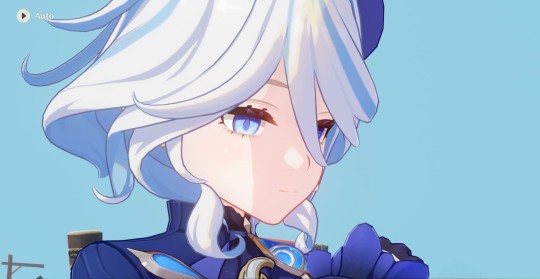
*thinking face on*
1. Autism is, at its core, a difference in the way the brain takes in, processes, and shares information. This can make it challenging to communicate with other people who don’t share this neurotype, but a high-masking autistic person has observed the way other people interact and spent years copying them, figuring out through trial and error how to act to best fit in and get the most positive responses from other people.
Furina’s ascension speech in Act V of the Fontaine Archon Quest, where she first presents herself to the people of Fontaine, is a great example of this observation of others with the goal of masking as well as possible. Furina initially gives the speech as comes naturally to her in a very straightforward and honest manner (also an autistic trait!). After the speech, she realizes that her citizens are responding with hostility to her humility and lack of authoritarianism, so she then plays off the original speech as a ruse and immediately redoes the entire thing more assertively according to the feedback she picked up on.
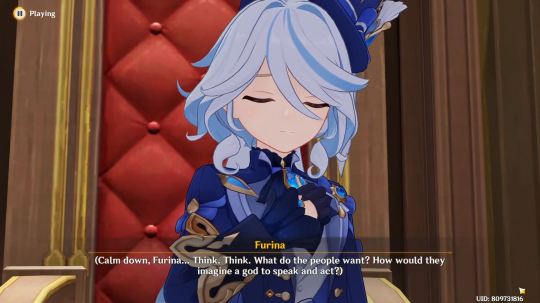
(Calm down, Furina… Think. Think. What do the people want? How would they imagine a god to speak and act?)
Fontaine AQ Act V, Chinese audio: (link starts video at 3:10:07) https://youtu.be/T-AbXi5bufk?si=eQADAWw6n8Sk0PZE&t=11407
This is the kind of social trial and error that many autistic people do over the course of years so that eventually we can say the “right thing” the first time around, and it’s a testimony to Furina’s skills as an actor that she course-corrects so quickly.
Because of all the constant mental calculations, social situations are usually very tiring for autistic people, even when the social event lines up with their interests. In Clorinde’s Story Quest, Furina has no interest in Navia’s suggestion of pulling an all-nighter to keep playing D&D (I mean, Tabletop Troupe!) and wants to go home and rest.
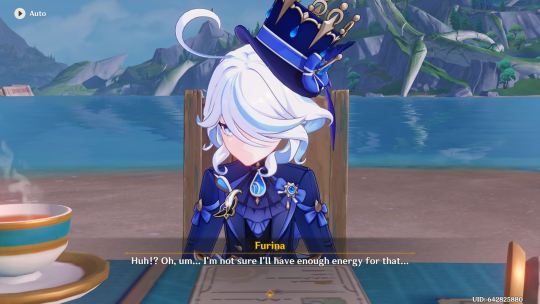
Furina: Huh!? Oh, um… I’m not sure I’ll have enough energy for that…
Furina has shown other signs of needing to take a break from socializing– for instance, in Lynette’s hangout event quest, Lynette gets tired of all the people at her post-performance reception and goes upstairs to a quieter room to find Furina already there.
Furina offers to give Lynette tips on the best ways to slip away from an event, and Lynette misunderstands at first and isn’t interested in Furina’s advice because she thinks Furina loves everything about the spotlight and doesn’t realize how much they have in common. This goes a long way to show just how well Furina masks her autistic traits!
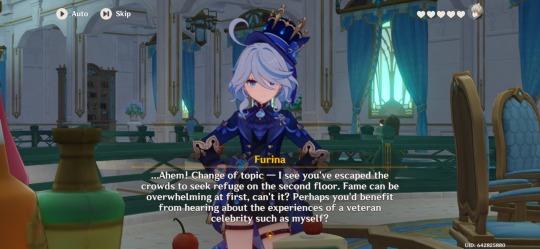
Furina: I see you’ve escaped the crowds to seek refuge on the second floor. Fame can be overwhelming at first, can’t it? Perhaps you’d benefit from hearing about the experiences of a veteran celebrity such as myself?
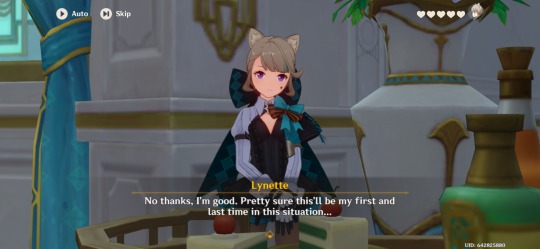
Lynette: No thanks, I’m good. Pretty sure this’ll be my first and last time in this situation…
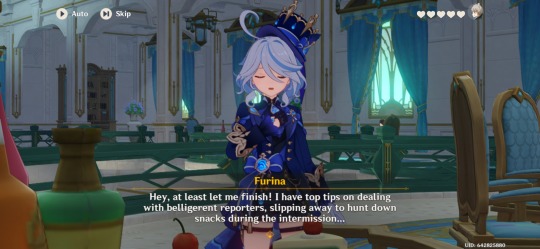
Furina: Hey, at least let me finish! I have top tips on dealing with belligerent reporters, slipping away to hunt down snacks during the intermission…
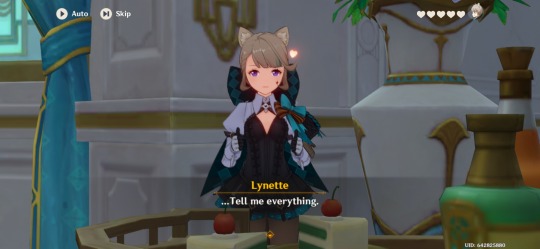
Lynette: …Tell me everything.
Conversely, when alone, Furina will stay up late reading or doing something else that interests her and will not feel the same need to stop and rest, because when alone, there is no need to expend extra energy worrying about socializing properly.
At the beginning of the Fontinalia Film Festival limited event story, Traveler and Paimon go to Furina’s apartment and she answers the door sounding a bit groggy.
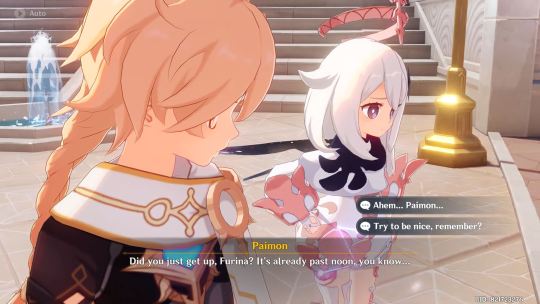
Paimon: Did you just get up, Furina? It’s already past noon, you know…
After Traveler chastises Paimon for being rude, Paimon panics and says something nonsensical about how the weather is so nice in the afternoon and sleeping in is fine, actually, and Furina responds that she’s just a bit tired because she was up late reading:
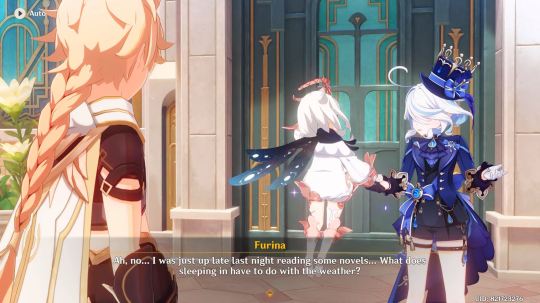
Furina: I was just up late last night reading some novels…
When focused on an interest, it’s very easy for an autistic person to lose track of time and it can be difficult to break out of the focused state and go to bed. (This is a trait that overlaps significantly with ADHD.)
2. Alexithymia is a difficulty with identifying, processing, and expressing your own emotions, and in extreme cases presents as an almost total lack of emotion. Some degree of alexithymia is common in autistic people.
I believe, in the flashback scene below from Act V of the Fontaine Archon Quest, that Furina genuinely did not realize she was upset and did not realize she was crying, which could be explained by alexithymia.
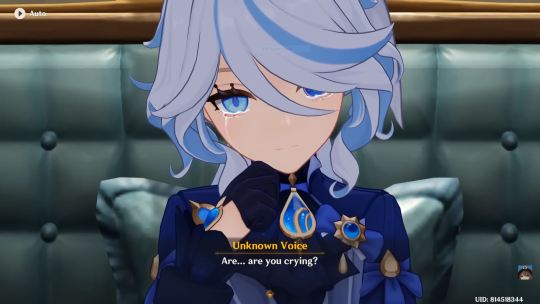
Fontainian citizen: Are… are you crying?
(If you played this part with the English voice acting and interpreted it differently, try listening to it in Chinese- Furina’s voice sounds completely confident and in control the entire time, and it’s not until the other person points out she’s crying that Furina sounds at all upset.)
Fontaine AQ Act V, Chinese audio: (link starts video at 3:22:00) https://youtu.be/T-AbXi5bufk?si=fl8xSwkQ0rRLFPQU&t=12121
I am a believer that Furina and Focalors were originally the same person, and Focalors is just Furina’s divinity and pre-archonhood memories— so if Furina is autistic, Focalors is autistic.
While talking to Neuvillette, Focalors is extremely matter-of-fact with her explanation of her plan, very matter-of-fact about the suffering of her own human self, and very matter-of-fact about her own impending death. There is no show of emotion— she just tells Neuvillette the facts. This could be related to alexithymia, but regardless it is a very autistic way of communicating that is often misinterpreted as cold and uncaring. In actuality, someone who is willing to sacrifice their own immortality, divine power, and freedom to save other people’s lives cares a great deal, even if the tone of their voice doesn’t reflect it!
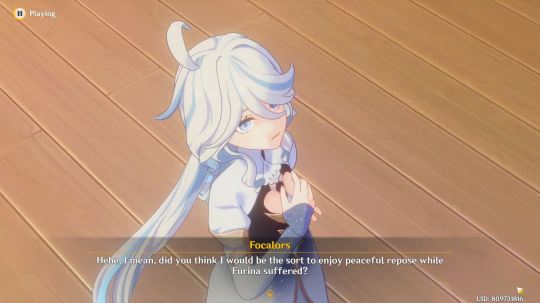
Focalors: I mean, did you think I would be the sort to enjoy peaceful repose while Furina suffered?
3. The autistic nervous system takes in a lot of information that a neurotypical person’s would filter out as not being important enough to bother with- this is why autistic people are so much more sensitive to sounds, lights, textures, and any changes in the environment. Too much sensory input can actually feel painful.
There is a documented instance of the Opera Epiclese becoming so loud that Furina was overstimulated enough to yell at everyone to be quiet.
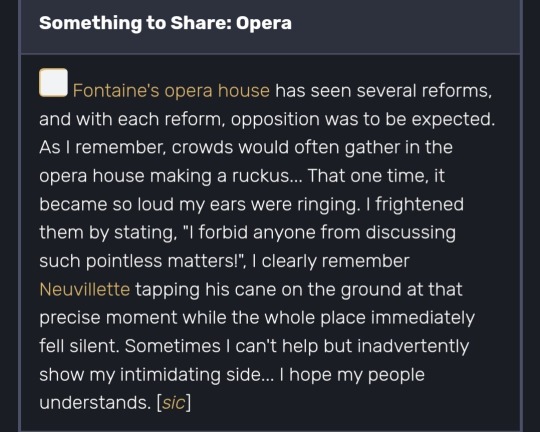
Furthermore, post-Archon Quest, after moving out of the Palais Mermonia and into her own apartment, Furina eats primarily macaroni for an unspecified amount of time— weeks or months on end. After a huge life change, it’s common for an autistic person to want anything they can control to be the same, so their brain has more space to process everything that’s different.
There is no neurotypical explanation for eating the same food over and over to the exclusion of everything else. It makes no sense to someone who doesn’t experience overstimulation and distress at too much change. Case in point, during Furina’s Story Quest, Traveler and Paimon are rather baffled:

Traveler: …Don’t you get sick of macaroni every day?
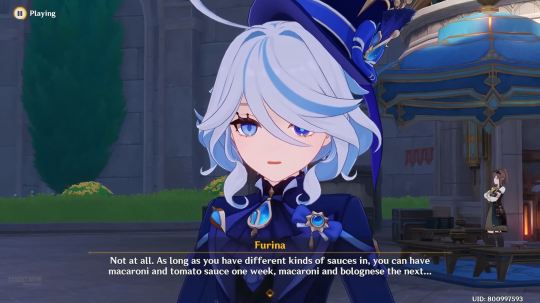
Furina: Not at all. As long as you have different kinds of sauces in, you can have macaroni and tomato sauce one week, macaroni and bolognese the next…
Notice that Furina says “macaroni and tomato sauce one week,” implying that she’s fine with just that sauce for an entire week, and then uses a different sauce for the next entire week. Still not very much variety!
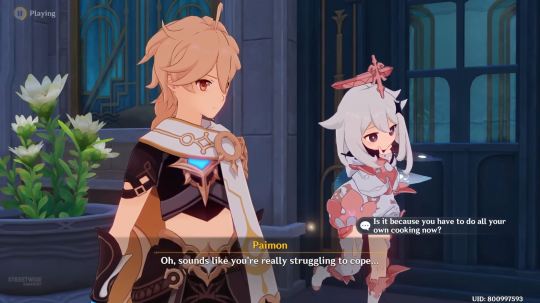
Paimon: Oh, sounds like you’re really struggling to cope… Traveler: Is it because you have to do all your own cooking now?
Yes, Furina is struggling to cope, but not because she’s incapable of learning how to cook more complex dishes! She’s just too burnt out to want to make or eat a variety of things right now. Furina explains this and Paimon doesn’t believe her, but since we know that Furina’s special dish is an even more extravagant version of La Lettre a Focalors, if Furina is capable of baking at that level, she would certainly be capable of cooking.
4. Stimming, or self-stimulatory behaviors, are repetitive actions that serve to regulate or soothe the nervous system. There are countless behaviors that can be used as stims, but some common ones are rocking back and forth, hand flapping or waving, leg bouncing, skin picking or scratching, rubbing or squeezing a comforting object, dancing, spinning in circles, humming or vocalizing, or listening to the same song on repeat for hours. (It’s worth noting that stimming is not exclusive to autism— especially when stressed neurotypical people do some of these things too. Stimming can also be commonly exhibited by people with ADHD who aren’t autistic, although there are also a significant number of people with both ADHD and autism.)
One of Furina’s idle animations and also her normal attack sequence include behaviors that can be interpreted as stimming. Furina’s idle animation with Surintendante Chevalmarin involves her holding the seahorse up, waving her around, squeezing her tightly and rubbing her face on her head. Chevalmarin is made entirely of water and loves Furina dearly, and so does not mind being cuddled like a stuffed animal.
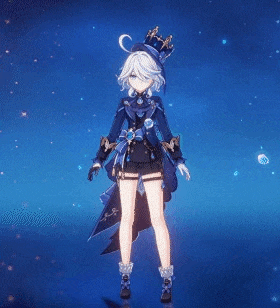
If you use all four of Furina’s normal attacks, she spins around several times and the final attack culminates with her spinning on a bubble and swinging her sword for AOE. If you use just three of Furina’s normal attacks and do not append any additional actions, Furina spins around again before plunging the tip of her sword into the ground (I do not have a gif of this). Furina also spins around when added to your 4-character party. That’s a lot of spinning, which certainly makes it seem like a preferred stim!
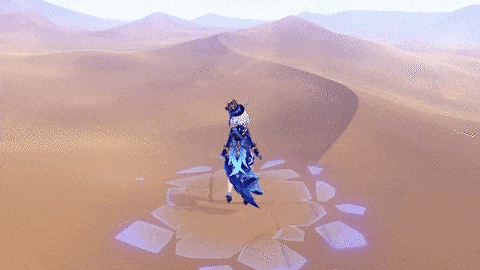

5. I got this far without mentioning special interests because I have so much other evidence that I hardly need to bring it up— but since it’s a much more commonly recognized autistic trait than many of the things I discussed at the beginning, I will include this part of Furina’s teapot dialogue, which does indicate that Furina engages in special interests:
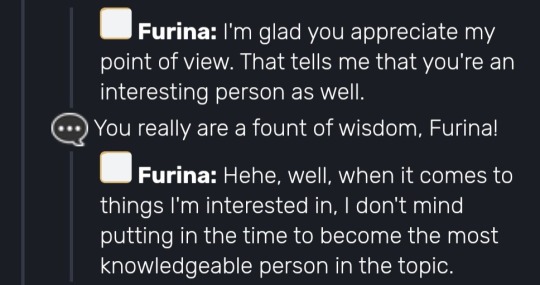
Furina pretty much defines “special interest” with the above statement: it’s something that you’re interested in (to the point that it may feel like an obsession) and you have to know everything about it!
These are just a few examples of autistic traits that Furina exhibits— there are absolutely more. Furina is shown many times to have a high level of near constant anxiety despite being someone who is confident enough to perform on stage. This anxiety could come from other sources, like c-PTSD, but it’s very common for a high-masking autistic person to have chronic anxiety from being hyper-aware of avoiding potential social blunders, repressing stimming to appear more “normal,” and dealing with the increased risk of overstimulation that comes with repressing stimming.
If you made it this far, thanks for reading! Even if you don’t agree with my interpretation of the character, I do genuinely hope you learned something about autism.
132 notes
·
View notes
Text
Behind the locked door
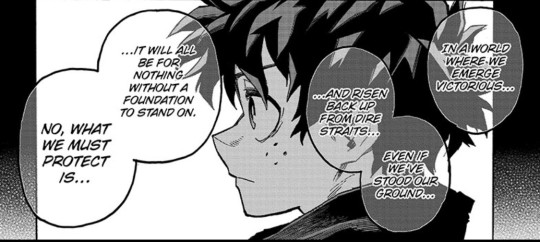
In honor of Izuku’s mask disintegrating into rubble, I think it’s finally time for me to really dig deep into his character. I’ve been keeping this one in my back pocket for a while. Amid all the talk about Izuku’s fading narration, the “control your heart” subplot, I’ve been trying to find the words to articulate how I know exactly where this is going, at least on a certain level. Most recently, I read this meta from pika who brings up how the word “control” alone can be misconstrued (by us). And then I thought about how a while back I made a similar point, although I said Izuku was the one who got it wrong. At that time, I was holding back a huge piece of evidence because it was external to the story and I wasn’t sure it would be received well. As a result, my argument fell a little flat. Well, now—after 411, right before leaks for 412—it might be my last chance to play this card.
So about that external evidence. I struggle to bring it up because it’s gonna sound an awful lot like I’m projecting onto Izuku if I don’t do it justice. But… I look at the way his storyline has been going lately and I see a pattern emerging that I’m very familiar with. Fortunately, I don’t have to dump a bunch of personal junk on you in order to illustrate this pattern, because a certain personality typing system already has it all figured out: the Enneagram.
Now, hang on. I’m not one to put people in boxes. My trans ass? I managed to get a different result every time I retook the P0ttermore quiz. MBTI, zodiacs—not my thing. But the Enneagram comes the closest I’ve ever seen to covering all the bases and revealing actually meaningful insight, at least for myself. On top of that, I find it extremely useful for fleshing out fictional characters, hence this post will be taking advantage of that.
For those who aren’t familiar with it, here’s a quick overview: The Enneagram consists of 9 individual personality types, each arranged carefully in a sequential, circular manner. They are also simply named 1 through 9. While this might seem kinda basic, there is actually a surprising amount of nuance and fluidity involved. Typing is done largely through personal introspection (you don’t really have to take a test). Adjacent numbers share some core themes with each other, and according to a web of arrows between them, one type can take on either positive or negative traits associated with other types depending on how emotionally ‘healthy’ they are, causing a lengthy spectrum of different ways each type can manifest. That part gets kinda complicated to explain here, so for more info, the Enneagram Institute website is a decent place to start. I also highly recommend the Enneagram album by Sleeping At Last (and if you really want to dedicate some time, the accompanying podcast) to really get inside the heads of the types on a deeper level.
My interest in applying the Enneagram to Izuku comes from observing how differently one can interpret his character based on whether you read him as a 2 or a 9. And even though no one uses this language to talk about him, the distinction accounts for a bunch of different rifts in the fandom: whether you appreciate bkdk’s relationship, whether you can acknowledge Izuku’s flaws and weaknesses, the severity of his vigilante/rogue phase, and most importantly the gravity of his concealed heart, his rage, and what it all means—what he needs in order to grow and triumph.
Discussion of Enneagram types in the fandom is pretty scarce, but where it exists, I have only seen him labeled as a 2. Type 9 and type 2 can be similar at a glance in a lot of ways (actually, 9s can be mistaken for any type because they are like all of them combined). It’s easy to see Izuku as a 2 because he is the helping hero archetype. He puts others’ needs above his own and he is always ready and eager to help. If you listen to Sleeping At Last’s song for 2, you’ll notice that it’s all about care and noble sacrifice with the underlying theme of neglecting or even harming oneself: “I just want to build you up, until your good as new, and maybe one day I will get around to fixing myself too.” Sounds pretty obvious, right? Well, here’s the thing. You really get to know what your type is by how it hits you where it hurts, so I like to focus on each type’s basic fear and basic desire, first and foremost, as a tell. A 2′s basic fear is of being worthless and unloved. Consequently, their most basic desire is to be loved. And 2s have been taught through their negative experiences that love is conditional, something they have to earn from others. They need to be needed. So let’s say you think Izuku is a 2. This means you consider his heroic, self-sacrificing tendencies to be a result of his growing up quirkless and being told he is worthless and powerless because of it. Through this lens, he is trying to prove himself to the world by being useful. Along these lines, you may also assume he is trying to prove himself to Katsuki. Taking this train of thought even further, you may interpret Izuku’s relationship with Katsuki as an obsession of his, where he is either blind to Katsuki’s more negative traits in favor of gaining his love and praise, or else bitterly determined to prove him wrong. This is how a 2 might behave in an unhealthy relationship with an 8, which, yes, I do think Katsuki is an 8. That’s a tangent for another time, though.
But does Izuku ever “need to be needed?” It’s worth noting that while 2s’ search for validation might seem insincere, it is actually motivated by a deep, heartbreaking insecurity. They think they don’t even deserve love unless they are useful to someone, so they do everything they can to be worthy. Does Izuku show signs of this motivation?
If I stop to think about it, I can’t exactly see this in Izuku’s character. Yeah, his dream is to be a hero, and in his childhood, he was denied that dream. However I think we need to take a step back from that for a second if we want to dig deep. I mean, a lot of the other characters also behave heroically, act selflessly, and strive to help. Does that mean all of them are 2s as well? Of course not. So let’s instead turn to observe how Izuku acts with his loved ones, friends, and peers in other/adjacent contexts:
Inko: He is committed to protecting his mother from fearing for his safety. He wants to be good enough to not cause her to worry, rather than good enough to make her proud or make her love him. Idk about his father but at this point I think it’s safe to assume he is deeply unimportant.
All Might: I would describe their relationship as one of mutual responsibility. Izuku feels a responsibility to uphold All Might’s legacy, All Might feels a responsibility to teach him well. Because of this mutuality, I don’t think it quite makes sense to say Izuku deliberately seeks approval for its own sake. You know what I mean? They may be a mentor and a pupil but in practice they are almost more like co-conspirators. They don’t really have a power dynamic going on.
Shouto, Tenya, other friends: Izuku seems to take an interest in what makes his friends tick, and he sets himself aside in order to both analytically and intuitively determine what’s wrong and how to solve it. Examples include his fight against Shouto in the sports festival, and his stubborn concern for Tenya’s reaction to his brother’s forced retirement. He will put himself in the line of fire specifically when confronted with another person’s inner demons. This is not a labor that is asked of professional heroes, it’s just who Izuku is. You can also extend this observation to how he sees through Tomura to Tenko, but I’ll get to that later. Basically, while 2s seek to help in all kinds of ways, a 9’s strategy is always centered on the realm of the mind.
Kota: Adjacent to the paragraph above, before Izuku literally gets into a position where he needs to save Kota, he becomes interested in the boy’s point of view out of genuine curiosity. He doesn’t go “oh no, this kid doesn’t like heroes, I better get him to like heroes.” Instead he seeks out information as to why he thinks that way, and patiently listens. He’s sorry about what happened to Kota, and he understands. Twice (ch 71 and 72), he recognizes the fact that everyone has their own point of view on quirks, and he can’t really do anything about that.
Mirio: This might be one of the most telling examples. Mirio is the platonic ideal of an All Might successor. He’s “perfect.” He even looks the part. While this initially makes Izuku uncomfortable, he doesn’t become insecure and defensive over it. On the contrary, he easily comes to the conclusion that actually, Mirio should have One for All. Just like that (ch 172). If Mirio hadn’t dismissed the “hypothetical,” he probably would have gone through with giving it to him. That’s not how a 2 would respond. A 2 would double down and aim to be better than Mirio by trying to establish some relationship of need, fueled by the insecurity. Their shared subplot with Eri would have looked pretty different, I think.
Katsuki: I’ve mentioned before that I believe their rivalry only exists because Katsuki put it there. First of all, we can see that after the sludge villain incident, Izuku weirdly takes Katsuki’s dismissal of Izuku’s help as practical advice. Like, “oh yeah, I guess what I did was pretty stupid and dangerous, and I’m not cut out for this hero stuff. Now I can move on and find a realistic career.” Hello?? He accepted that so easily. So Izuku clearly isn’t motivated by a desire to prove himself to Katsuki. Even when he proclaims he’s going to surpass him, it’s like he’s happily mimicking Katsuki, not reacting based on insecurity or pride. Izuku is content to meet Katsuki wherever he is, and he’s satisfied with whatever kind of relationship they are able to have, including a rivalry, so he isn’t vying for his affection either. We can observe this when he gives up the role of reaching out a hand to save Katsuki to Kirishima, and also when he thinks about how “blessed” he is to even have a normal conversation with Katsuki. He doesn’t push things. It’s also stated in Deku vs. Kacchan 2 that Izuku doesn’t excuse or overlook Katsuki’s “bad side” but still admires him for his other traits. This is not at all characteristic of a toxic 2x8 relationship.
When 2s are at their very worst or pushed into unhealthy situations, they tend to become more needy and self-centered, even downright manipulative. But at Izuku’s worst, when he went rogue, he pushed everyone away to avoid being a burden. When the refugees at UA tried to prevent him from returning, he was like, “you’re right” and would have turned back immediately if not for his friends, loved ones, and other people who care about him telling him it was all okay. Meanwhile, Katsuki, in true 8 fashion, was pissed off at being rejected and having to deal with Izuku’s stubborn and evasive side (oh yeah, have I mentioned 9s are actually stubborn as hell?), but he made sure to establish that they are (he is) here to step in when Izuku can’t handle things by himself. Katsuki even opened up and admitted to his own weaknesses to show why mutual support is so important. Tbh, a lot of the above can be construed as just super healthy type 2 behavior, but not this. The way Izuku acts at his lowest, and his dynamic with Katsuki? Totally different. Dead giveaway for a 9.
Let’s get into the type 9 itself in more detail to show how it applies to Izuku more deeply—seriously, it’s beat for beat. One of the key differences is, while 2s seek validation, 9s are actually resigned to the belief that they aren’t important. Similar to 2s, a 9′s basic fear is of separation, but their basic desire is actually just peace or harmony rather than love. Notice how these motivations are just like a 2’s, except they have the “self” part taken out. With that in mind, they “achieve” their basic desire through selflessness in and of itself, without the need for recognition. That’s not to say that 9s are better than 2s. In fact, a 9 can be worse, in a way. If unhealthy, they will seek peace at almost any cost to themselves. In other words, they can be more self-destructive while still under the impression that they are doing just fine. “Peace” may refer to the expression of empathy, fulfilling the needs of others, sheltering someone, or mediating a fight—but also to repressing their own opinions and needs, not “rocking the boat,” ignoring negative emotions, or becoming a vessel for someone else to vent to.
What about inner peace? 9s value serenity, and thus they have a complicated relationship with the most tumultuous of emotions: anger. On the surface, 9s look like the type that is extremely slow to anger and highly tolerant. However, as much as they would like to believe this about themselves too, deep down, 9s are afraid of what might happen if they lose control. My phrase for it is this: I feel like a bottled tornado. Personally, I also think of anger as a basic desire to make others feel your pain—not necessarily sadistically, but in an effort to be known, to be understood. The difficult thing to grasp, especially for a 9, is that this is NOT inherently a bad thing. It isn’t wrong to seek sympathy. On the contrary, it is harmful to tell yourself that getting angry is wrong, because it’s like telling yourself that your pain is wrong, your pain doesn’t matter.
The problem is it doesn’t stop there. A 9, in shutting down their anger, ends up with such a low opinion of their own heart, their other emotions dull along with it. They cry less, laugh less, love less. It’s often said that they “fall asleep” to themselves. It all starts with anger. It’s interesting to note how different this whole mindset is from toxic masculinity—where men only feel allowed/able to express emotions through anger. This is sorta like the opposite. Anger becomes the dam rather than the river. For Izuku, I want us to consider that his suppression of anger carries with it the implication that he is hiding other things, too. It’s a given. There’s a whole sea of feelings out there, and we can only see the waves hitting the shore. This brings me to the whole “control your heart” thing. I do think it is worth mentioning that Banjou didn’t just tell Izuku to exercise control. He also told him that his anger could be useful if it is harnessed. With this added context, “control” here means “to master.” And Izuku seemed to grasp this concept… sorta. I think that if Izuku is like a 9, we can assume he has trouble understanding how anger could be a worthy source of strength. His emotions in relation to Katsuki feel more like a weakness to him, a character flaw in a hero, who is supposed to be detached and selfless. But he’s trying to understand, even though he’s afraid of it. He essentially applied the same strategy he used for mastering OFA itself: incremental strength training. Which, okay. Take a moment to absorb how odd that is, in relation to emotions, specifically. Does one learn to cry incrementally? Does one learn to use anger by bottling a fucking tornado?? Like, what, you think you’re gonna be able to let out juuust the right amount of air to avoid an explosion??? No, man… if you want to be the master of your emotions you have to be willing to sit with them. Confront them. Listen to them. Take them in completely and accept them as a part of yourself.
For someone like Izuku, though, it is very difficult to imagine how this is even possible. Tomura, as with every villain, can be used to reflect his hero counterpart’s greatest fear about himself. Tomura literally touches everyone and everything with his rage, and as a physical manifestation of that desire to pass his own pain onto others, destruction radiates from his fingertips. Thus, losing control in this manner must be Izuku’s worst nightmare, as if he would be completely unable to stop the collateral damage like an infinite line of dominoes. But his anger is not something he can overcome, as such.
An overarching theme in this heroes vs. villains conflict is that the villains are not merely obstacles to be overcome. Just think back to Himiko’s bitter rejection of the heroic sense of superiority. She demanded not to be pitied, condescended to, or lied to. Likewise, the answer cannot be that Izuku needs to restrain himself where Tomura doesn’t. What purpose would it serve to show that Izuku is better than him? Certainly not saving Tomura. If this was a battle against AFO, it might have been a different story. In that case, Izuku would have to overcome his emotional manipulation tactics. Tomura, on the other hand, is not so strategic. With his strangely childlike tendencies, he must relish making Izuku mad because it brings them closer to the same wavelength. It’s his own twisted way or seeking sympathy, or at least, the closest thing to sympathy he can get anymore, because he believes he is beyond saving. With that in mind, Izuku isn’t going to get anywhere unless he rises to meet him. Izuku has to match Tomura’s hatred with equally strong emotions of his own, whatever they may be, or else face the loss of OFA (as established in 305). This is not an easy thing to ask of a 9, once they have started to pull the blood from their extremities, become cold and numb. Bringing back circulation is painful and makes the skin crawl.
In case you’re worried about the focus on anger here, I want to reiterate that concealed anger in a 9 is just one sign of so much more. Back when everyone started fretting about Izuku’s habit of self-sacrifice, which would have been the only thing we need to worry about if he were a 2, I was freaking out because Izuku was also starting to look like a person who has too many secrets. You don’t even have to acknowledge the possibility that he lied about what triggered blackwhip. It’s written all over his face all the time these days. It’s especially noticeable when you contrast him with Katsuki after all his own growth. Katsuki confides in people. He acknowledges his weaknesses. He enjoys being himself. He asserts his place. He thinks about Izuku all the damn time and now he even lets himself be soft about it. All this warmth while Izuku is distant, muted, and blank. I know all too well what this state of mind is like. Man, I hate secrets. You get to the point where you don’t know how to talk about even the simplest most inconsequential shit. And the bigger things? They’re like a growing snowball of words in your throat that cannot possibly fit out of your mouth. The “easiest” way to cope is to simply fade into the rhythm of life. Go with the flow.
Since 9s have a natural curiosity about the interiority of other people, they may choose to focus on that in order to divert their own attention away from themselves. Taken to the extreme, they will lose track of their sense of self. Like I said, you can see Izuku doing this as he fights, analyzing the psyche of his opponent, and his match against Shouto in the sports festival was a fantastic early example. They became friends because of how observant Izuku is. His emotional intelligence and intuition are very strong, but gradually, as he has taken on greater responsibilities and experienced more trauma, he has gotten worse at applying these skills to himself. You know, we go on and on about how his narration has been reduced to nearly nothing, and it’s not just an absence of introspection, it’s an absence of self. It creates a lack of ownership over the narrative—what should be his narrative.
Right now, he’s focusing on trying to see Tomura as a person, figuring him out. I think it would be really satisfyingly ironic if in the process, he ends up uncovering insights about himself instead. It’s about time we learn what Izuku’s secrets are. I don’t actually think that Izuku mastering anger will constitute the emotion that is strong enough to keep Tomura from taking OFA. Moreover, he can’t expect to reach Tomura’s core, Tenko, unless he exposes his own. Rather, anger is the conduit for Izuku to unlock something else. Think of the way he described how Katsuki is his image of victory. The feeling manifests when he asserts a stronger sense of self (the urge to win) and he becomes more free with his words. I have no doubt that Tomura has the power to make unfiltered honesty spill out of him. He knows how to bring out his selfish needs, his pain, his pressure points, his fears, his insecurities. Hell, maybe Mt. Fuji erupting is a metaphor. I want to see Izuku explode while Tomura watches with mad glee. But then I want Izuku to Realize Things such that it finally sets him free. Then, instead of Tomura witnessing yet another person he touches fall apart, he gets to see someone become whole.
"I let the scale tip, feel all of it. It's uncomfortable but right. And we were born to try to see each other through. To know and love ourselves and others well is the most difficult and meaningful work we'll ever do." --Sleeping At Last, 'Nine'
#you are very much welcome to send me asks about this and the enneagram etc because it's very fun to talk about!#bnha meta#bnha manga#bnha 411#bnha 412#mha#my hero academia#boku no hero academia#character analysis#midoriya izuku#shigaraki tomura#bakudeku#bkdk#dekubaku#dkbk#lin speaks
314 notes
·
View notes
Note
This might be a silly question but the cast is so beautiful and I enjoy their beauty, so I'm curious, what do you think are Jacob and Sam's most beautiful features or what makes them so attractive? :) Actually, that could be both physical and personality-wise--what are your favorite physical features and favorite aspects of their personalities? :)
Not a silly question! A wonderful question, I love any opportunity to talk about how beautiful Sam and Jacob are.
I'll start with their physical traits and I'm going to limit myself to five things for each because I will end up just saying everything if I don't limit myself (😭), and I'll start with Sam. 1. Smile! Sam has a slight overbite and if he's smiling in profile then we get a really good look at it and it's soooooooooo stunning. I've said this before about the entire cast, but I'm SO glad we have a cast that all have their own teeth and not veneers. Teeth are so unique and wonderful and they're all so beautiful with the teeth that are theirs.
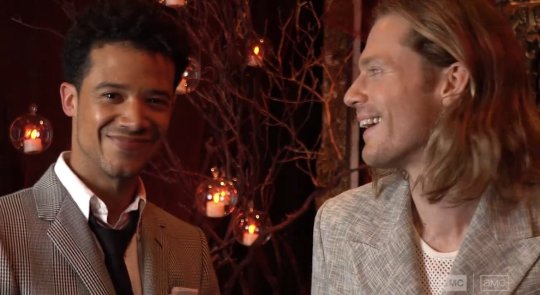
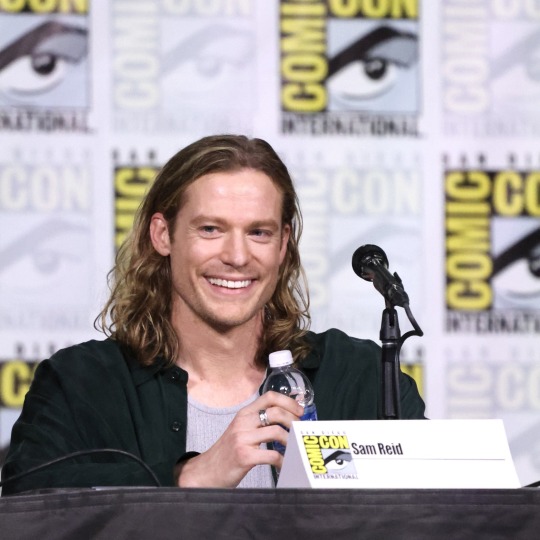
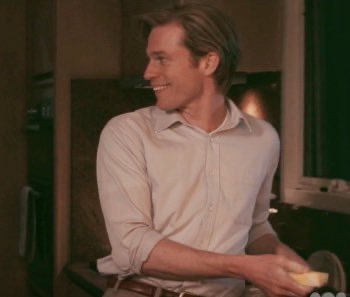
2. JAW. I talk about it often, but the sheer definition and size of his jaw is a gorgeous feature of his. A defined jaw is already really attractive, but his adds, once again, a uniqueness to his face that is unparalleled.
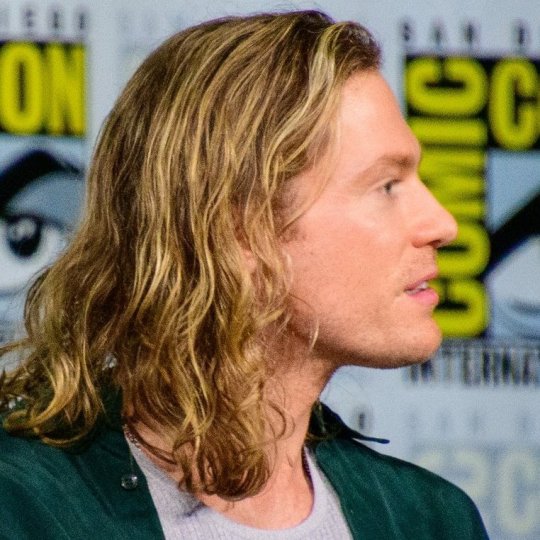
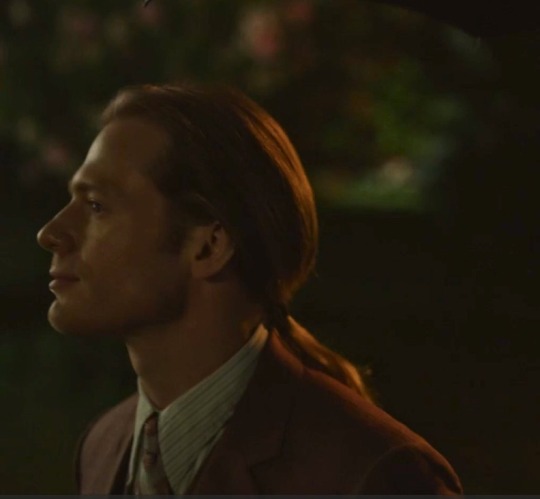
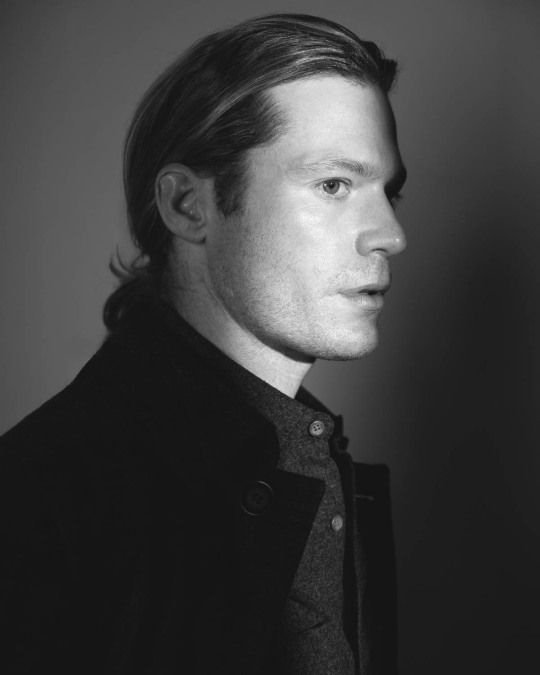
3. Mouth scarrrrr. Realizing I'm spending a lot of time talking about his mouth area, but I can't be blamed for that. Again, his scar is a unique feature that works so beautifully on his face and it adds something to his smile (and works so well for Lestat, this beautiful and -- when chosen -- dangerous quality).
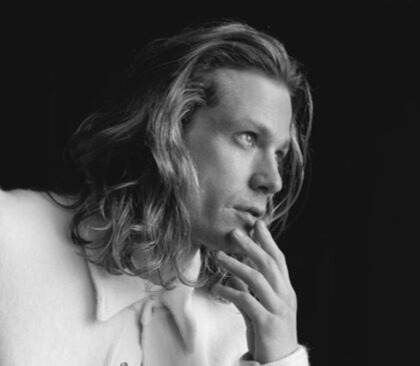


4. Ridiculous broad shoulders to little waist ratio. Superhero build fr. Unnervingly attractive, and insane to see.
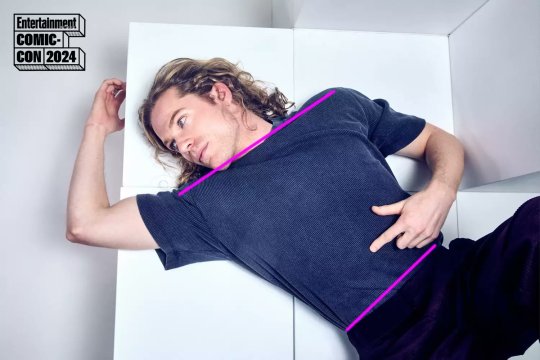
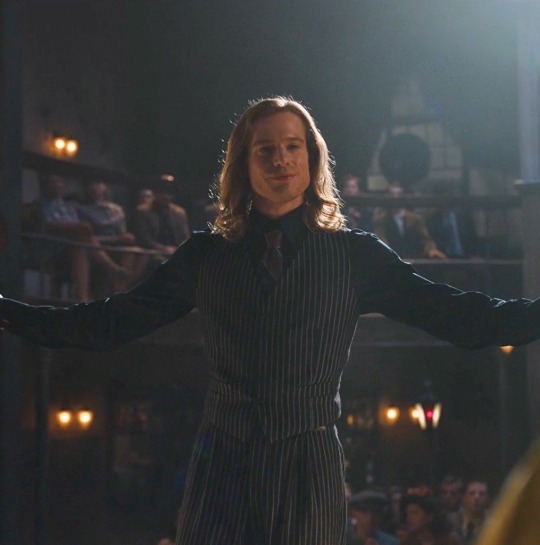
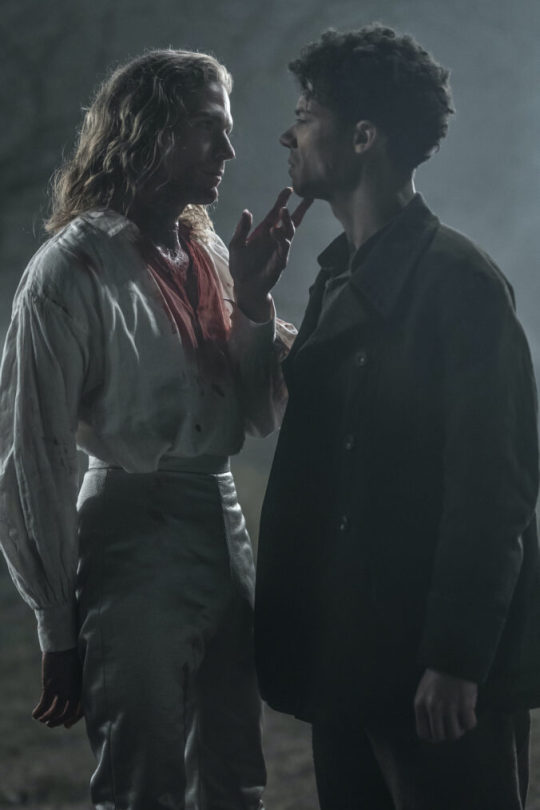
5. I can't post pictures of this one, but: VOICE. Quite literally cannot put into words what his voice does to me. Bass you can feel in your core, it's crazy.
NOW JACOB:
SMILE. Jacob has the. most. beautiful. smile. I've. ever. seen. There are times where he smiles and it's so heartstopping that idk what to do. In 1x7 when he smiles at Tom Anderson at the Mardi Gras ball, I get so angry that Tom Anderson got to be on the receiving end of that smile it makes me dizzy.
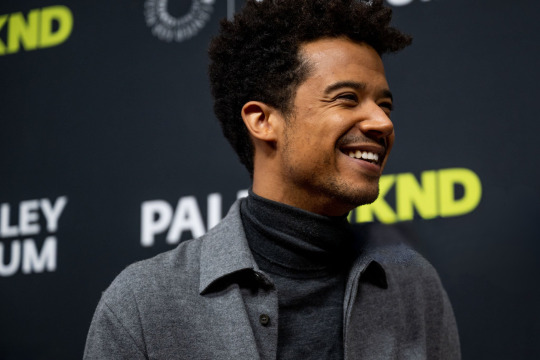

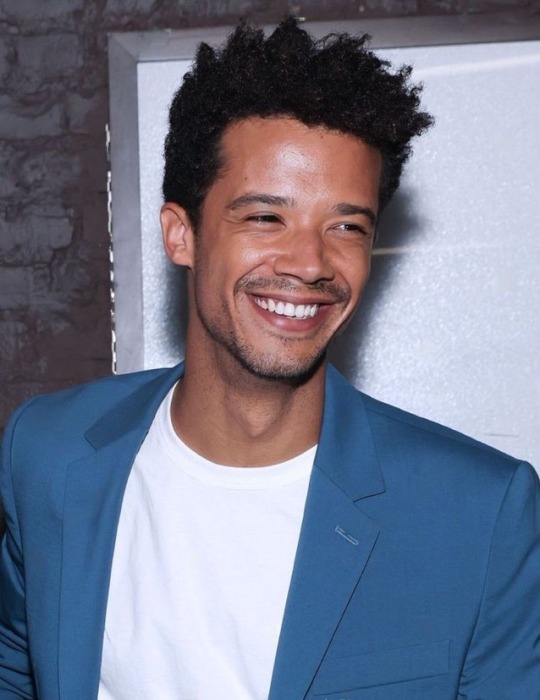
2. PROFILE. Jacob's profile is the most stunning profile in the entire world. His facial features work so beautifully together, and from the side all of his features are so easily seen and they're just !!!! Stunning.
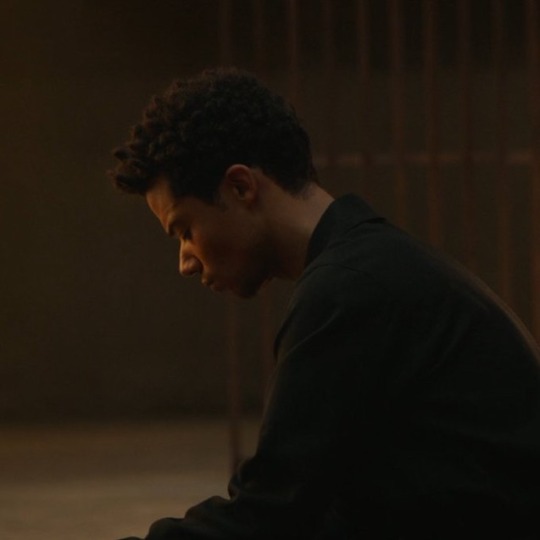
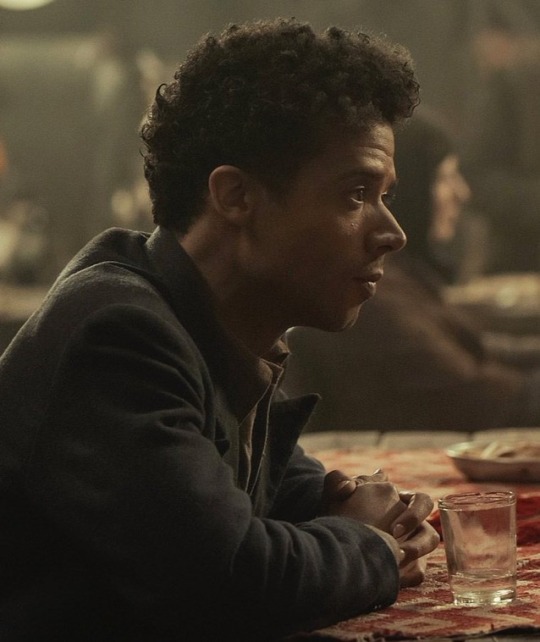
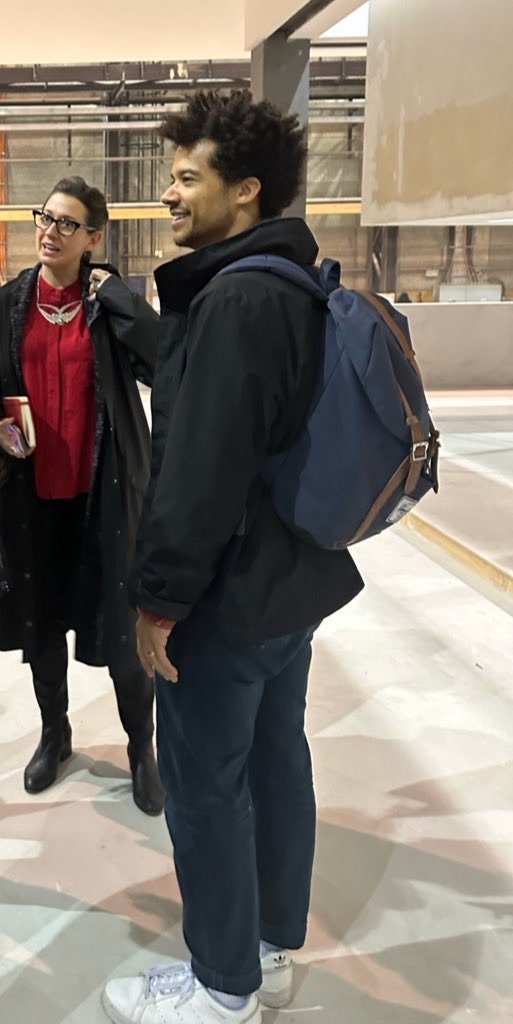
3. EYES. They're so deep and framed by these beautiful lashes and they crinkle when he smiles and you could truly drown in them, the most beautiful beautiful eyes.
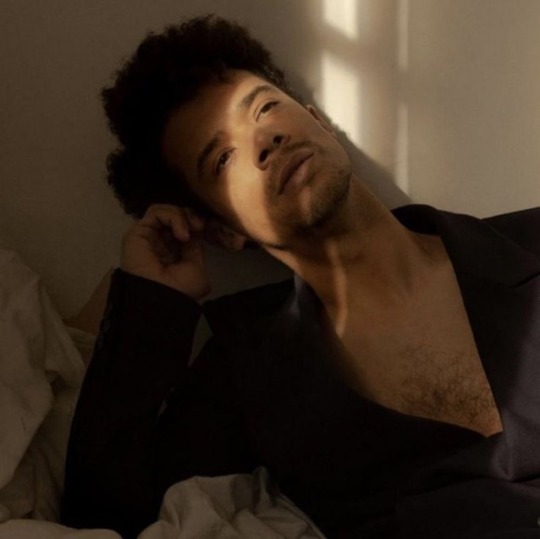
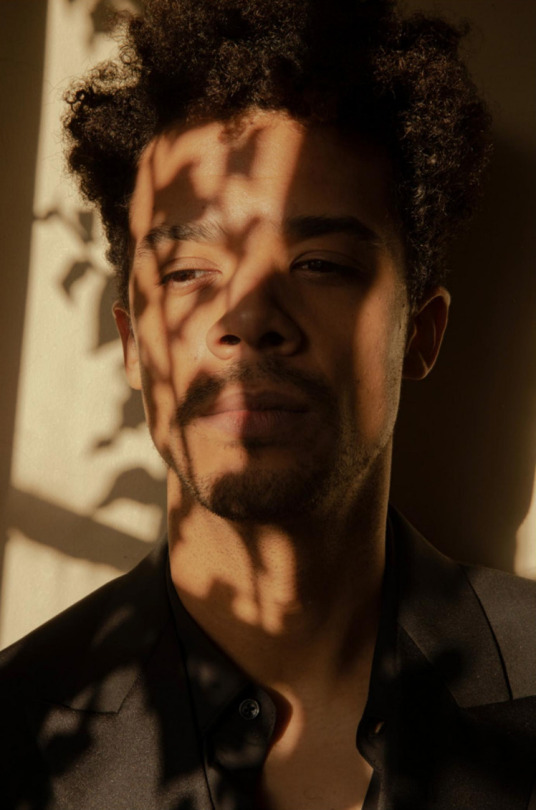
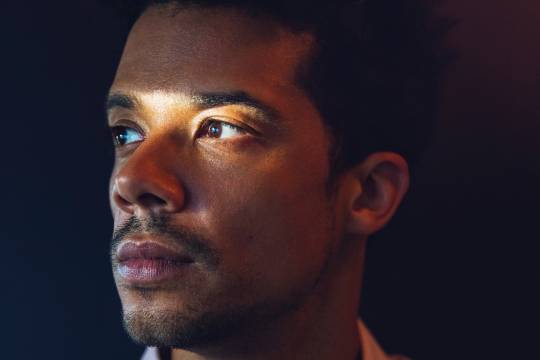
4. Itty bitty waist. Jacob is soooo tiny, even tinier in person, and his waist doesn't get quite as much attention as Sam's because Sam's shoulders are so broad that the difference in shoulders to waist is so apparent. Jacob's isn't quite like that because his shoulders aren't near as broad, but his waist is so itty bitty teeny tiny and it makes me insane.

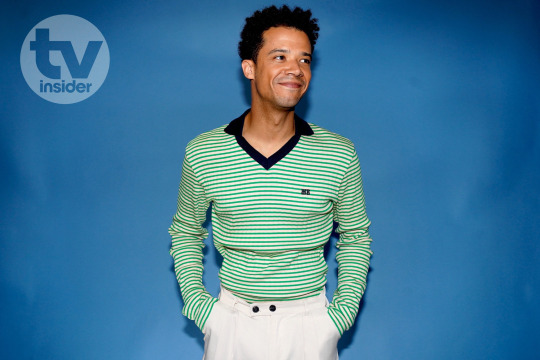
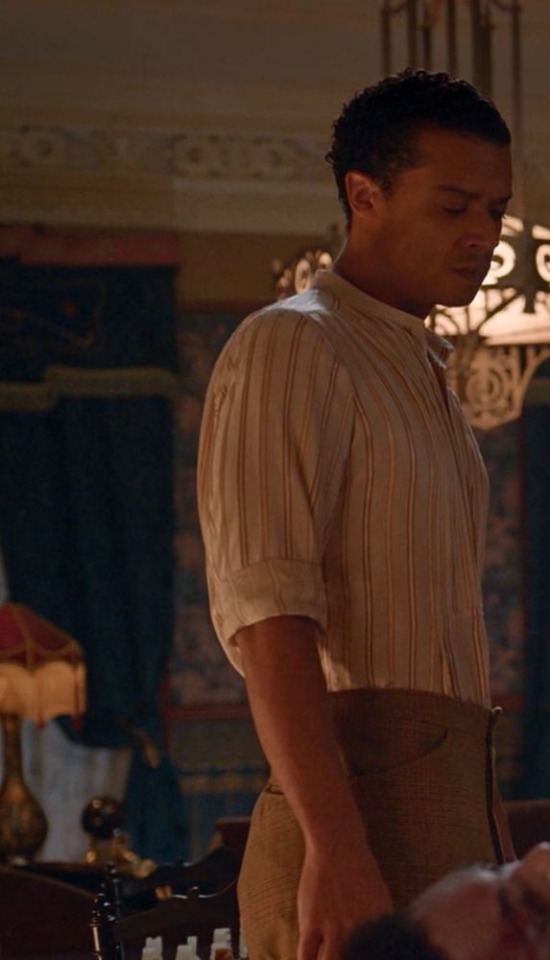
5. Also voice. I think Jacob's voice is deceitfully deep (he doesn't look like he should have a voice as deep as his is) and, especially in his own accent, is really warm. Like just his state of speaking is very warm. And I think it's the kind of voice, like silk, that you could sink down into.
As for their personalities, it's so hard for me to pinpoint exact things, but I'm in love with how Sam is generally very shy but he does get excited about things and it shows and his smile gets a little crazy (affectionate). I love how earnest Jacob is, how he sometimes catches himself oversharing and you can tell he's slightly self-conscious about it but it's so true and raw and real and vulnerable. I love how Sam is such a nerd, how he's been a theater kid since forever and his passion for books and storytelling shows through in all he does. I love how Jacob is such an unapologetic geek who finds joy in a huge variety of media and genres and lets himself grow with new interests. I love how they both genuinely seem to be so kind, Jacob throwing parties for the whole crew of iwtv and Sam chatting with fans. I love that they are girl-dads, truly, and how they have just taken to their on-screen daughter with such adoration and you can tell they will look out for her and Bailey forever. I love that they both are reserved but do share parts of them with us because that's really hard to do when you're reserved. Idk. There are so so many things about them to love.
45 notes
·
View notes
Text
wotw round 1

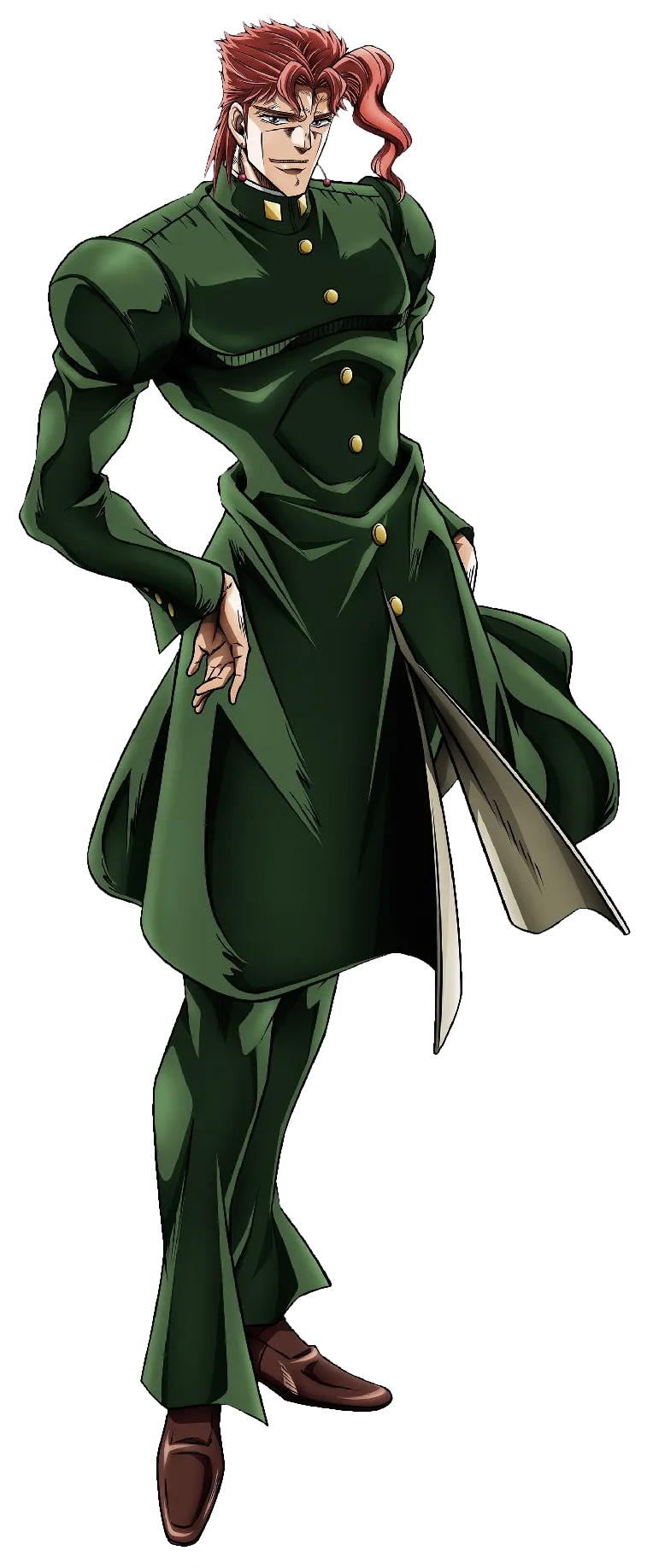
propaganda under the cut!
shen qingqiu:
Okay first a quick intro: Shen Qingqiu / Shen Yuan is the main character of SVSSS, and his deal is that he's a guy from the modern world who wakes up in the novel he read, in the body of one of the characters. Shen Yuan is his name in his original world, while Shen Qingqiu is the name of the character he became - that he uses for himself for most of the novel.
Now, what happened to him… The thing is, at the core of his woobification are his actual canon traits, but some fans really crank them up to the point where it becomes a disservice to the character. So you never know when someone saying "oh Shen Qingqiu is so oblivious" means "due to several intersecting factors Shen Qingqiu has some extremely specific blindspots regarding certain topics" (which is just true) or "haha Shen Qingqiu could get kissed by a man and still not realize that man has romantic feelings for him" (just one variation of the sentiment, but one i find particularly bewildering considering. in canon. a man kissing him was exactly what made Shen Qingqiu realize that man was actually in love with him. like my dudes the bar is low but its there!).
Stumbling into this second version in fic was funny a first few times, but now it's like… I genuinely can't tell whether any particular author is overplaying it for comedy, or genuinely believes the character is That dumb.
Also ppl often severely underestimate his power level. Like idk if that's because they compare him to the characters he often hangs out with, who are those genius top-of-the-world experts (despite him outpacing literally everyone else he ever fought against), or because of how he bungled his first-ever case (like, you know, two weeks after waking up in a whole NEW BODY, in a different world), or because he tends to downplay his own strength and also tries to avoid killing people… but like, this man took a technique that in the original was just "aesthetic and interesting" and developed it into something that could be super deadly within weeks, he's just not using it that way. And he also fixed og Shen Qingqiu's broken cultivation within the first few months of being in that body. So he's actually extremely talented and pretty strong, he just spends most of the book either nerfed by external factors (such as poison that disables his spiritual energy at random times) or surrounded by veritable powerhouses.
And this is for Shen Yuan-as-Shen Qingqiu. But the version that drives me completely up the wall is actually the portrayal of just Shen Yuan - in fanworks where he either never gets transported to the world of the novel, or wakes up as a different character. Because suddenly the traits that already get unduly amplified with Shen Qingqiu version become straight up caricature-like. He's not only oblivious to the extreme, he also gets painted as this completely naive soft babyboi (this is about a guy whose most well-known pre-transmigration canon trait is that he writes famously vitriolic rants about novels on the internet); plus, like, on the physical level, super frail and waifish which uh. wow. nice walking right back into the BL tropes the novel itself avoided?…… So yeah I'm super not keen on this portrayal. I know he doesn't appear as not-Shen Qingqiu version of himself in the novel, if we don't count the rant in the beginning, but like. please extrapolate from the character we actually have instead of writing this mega-woobie who shares nothing with the base version?
Terrible little bastard man who has a sad backstory but is actually genuinely a terrible person. Fans like to act like he is just a soft sad boi deep inside and make him lose all of his edge.
So the thing about Shen Jiu / og!Shen Qingqiu in canon is that we first learn of him as an unquestionably, almost cartoonishly villainous character. As in, he is literally a villain in the book our main character has been reading… before dying and waking up in the world of the book, as that very villain (hence the distinction of Shen Jiu being the "original" Shen Qingqiu, as our main character begins to use the name Shen Qingqiu for himself. Shen Jiu, however, is an old name that only the original has used). The original Shen Qingqiu that our main character knows is a serial child abuser in a teaching position, a murderer (killed his colleague, killed his old fiancee's entire family…), and a lecher (visited brothels and had designs on his female disciple).
Then, over the course of the novel, we learn more about Shen Jiu - in particular, that a number of things our MC "knew" about him were not true. He did not kill his colleague, but rather failed to save him, despite trying to; he killed his "fiancee"'s family because her older brother has abused him for years (and also, Shen Jiu was forced into agreeing to marry her), and also he only actually killed half of them (only men); he visited brothels because he only felt safe in the company of women, and he just went there to get a good night's sleep; and he only ever saw that female disciple he was accused of lusting after as a daughter. And in general, he had a horrible childhood, and was himself a victim of abuse.
However, not everything gets disproved. Shen Jiu still turned from a victim to perpetrator, abusing a child (coincidentally the protagonist of the og book) and trying to set him up to die/be killed several times. Canon is very clear on that point. The situation with Shen Jiu and the og book version of the protagonist is very much an illustration of cycles of abuse.
Also at a certain point, we meet the author of the in-world book, the one our MC was reading - who explains he scrapped Shen Jiu's tragic backstory because it would make him too controversial. Quoting from memory, something like: 'if you said he was a villain, he was also tragic; but if you said he was pitiful, he'd also done terrible things. All in all, a character like this was a hotbed for all kinds of fandom discourse.'
Prophetic fucking words.
Somehow, seeing all that, some 'fans' have decided to jump into a completely opposite direction: making Shen Jiu a poor little misunderstood meow meow who did nothing wrong ever and was a soft princess and totally was never mean to the protagonist ("the protagonist just has inflated sense of ego and misunderstood Shen Jiu's normal teaching as singling him out for abuse" was a take I had to see with my own two eyeballs. Theres btw an extra from Shen Jiu's pov where he laments that the fake manual he gave the kid has failed to horrifically kill him yet).
Which puts the rest of us in an awkward position of having to defend his canon assholery. Like, the whole point of this character is that he's complex! That he's both a villain and a victim! Reducing him to just one is doing him a disservice, and either extreme is equally incorrect! And this is something that happens with many similar characters, I know, but what boggles my mind about Shen Jiu's case in particular is that. it's spelled out. The whole deal with his character is spelled out in canon. And some people still go "oh so Shen Jiu was secretly the most morally pure and good character, got it". Like. how?????????????? ??? ?? ?????
noriaki kakyoin:
Uke-fied to the max so he can be shipped with jotaro lol
Ohmygod where do I even start. Kakyoin's the poster boy for twinkification and woobification of a canonically very capable, interesting (and not twinky at all) character who's so many things at once- a loyal friend, really smart, a bit of a weirdo, infodumping trivia at random times, quick-thinking in dangerous situations, reckless, polite and respectful, vengeful towards enemies but always kind to friends, depressed, determined and motivated in the face of mortal danger despite it all - even when he had the chance to leave the Stradust Crusaders and just come back to his normal life, he decided to stick with them. This decision eventually cost him his life since he got killed by Dio, the main villain. The fandom either calls him a cardboard with no personality (which is not true at ALL, where did that take even come from) or they downplay his canon badassery- Jotaro x Kakyoin shippers are often guilty of this along with twinkifying Kakyoin. The ship is fine, but they're way more interesting if you take into account their canon characterisation as huge weirdos who somehow work pretty well together- they're both different flavors of autistic that sometimes just so happen to align on the same wavelength.
#tournament poll#shen qingqiu#shen yuan#shen jiu#scum villains self saving system#scum villain#svsss#noriaki kakyoin#jojo's bizarre adventure#jjba#wotw#round 1
303 notes
·
View notes
Text
I loved how NEO pulled the rug out with Rindo’s character. At first, he generally seems much more sociable and outwardly friendly compared to Neku and then the game quickly goes "yeah, nah, he’s a huge fucking mess too." He’s a good kid fundamentally at his core but he can also be whiny, hypocritical, passive-aggressive, and kind of insensitive at times. He has a tendency to be judgemental and harsh to the people around him while not acknowledging his own faults, like when he complains about Beat joining the team even though he saved their lives beforehand because he’s not Neku or when he gives Fret shit for fawning over Eiji Oji and Kanon while falling for Motoi’s BS. He’s so pessimistic about himself and others that not even a death game that heavily emphasizes the value of teamwork can get him to fully come out of his shell, which is where his time-travel powers come in AND EVEN THEN it’s a double-edged sword since on one hand, it forces him to actively step up to the plate and survey the situation to find the best possible solution, which leads to him slowly growing out of his shell, but on the other, it also leads to him becoming overly reliant on his time travel so that he can walk back from potentially life-changing decisions without having to worry about it since he has a magic reset button. Which ends up biting him in the ass. Hard.
He’s one of those types of people who is ultimately a thinker and planner instead of a do-er, but his being young and overly impressionable takes this personality quirk to such an extreme that he's foundationally useless to most groups. He’s the type of person who you have in a group project who sits around and does nothing, but then complains with the project does poorly because he couldn't be bothered to speak.
He's so unconfident and directionless that he uses effectively Instagram as a means to listen to someone who sounds like some 2deep4u philosopher post dumb flowery bullshit that effectively has all the meaning of "Drink water when you're thirsty." and he admits to finding such "deep" meaning in these posts that it supposedly helped him through life. Because he's 15 and doesn't know anything.
However, all of this makes him interesting as a character because he’s, again, still a fundamentally good kid at his core. While he’s shown to have a fuse, he is also the kind of person who has the ability to think his emotions through. That's what we ultimately see when he and Fret finally talk and drop their beef. The game depicting Rindo's capacity for self-awareness and emotional reflection is a positive revelation of his character strengths. He proves that he's capable of recognizing when he's in the wrong and knows how to apologize, a trait he shows quite a few times throughout the story, while also doing everything he can to set things right as well as be more understanding toward how his friends feels.
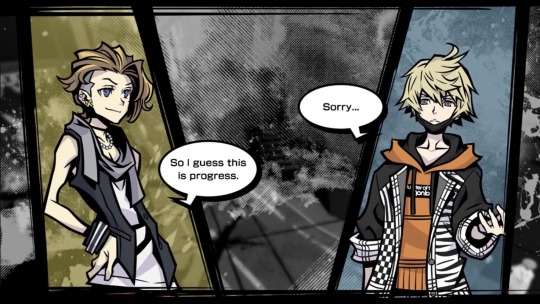



He’s kind of the guy who will drop everything to help a little kid out, even when there’s no tangible benefit to doing so and he and the others are shown to be on limited time, shows empathy to his friends/fallen enemies, and feels massive amounts of guilt for his actions, even if he didn’t know better at the time.
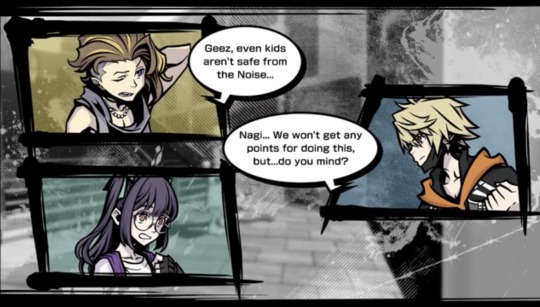
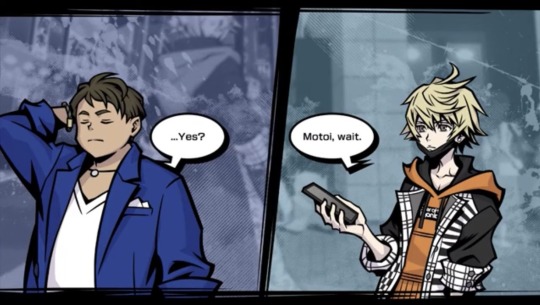


Hell, the entire endgame is fueled by his selfish yet understandable desire to save the people he cares about most from total erasure, to the point that he’s willing to risk thousands of lives to do so. But not only is he shown to be internally grappling with himself regarding his decision but he’s also willing to take responsibility and ensure that EVERYTHING goes right not just for himself and his friends but the people of Shibuya in general, in a parallel to Neku’s own selfish if understandable decision to put the bonds he formed in the original game (particularly with Joshua) over the actual city.
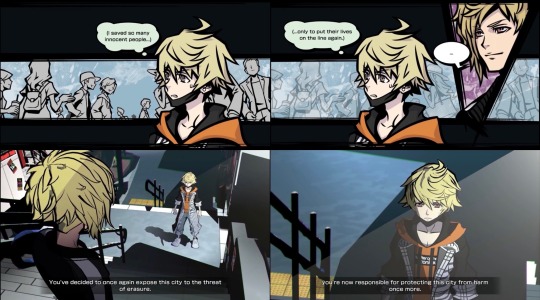
Characters aren't interesting simply by switching between 2 different character traits. They're interesting when all those traits are being expressed at the same time for reasons that are consistent within their internal logic. You gotta be a good writer to pull that off and you gotta know when to show off these dimensions during your story to achieve proper dramatic effect when the time calls for it and NEO I feel does this pretty damn well.
#rindo kanade#twewy#the world ends with you#neo twewy#ntwewy#neo the world ends with you#analysis post
250 notes
·
View notes
Note
We would love to hear more about being a "system of zero" - is it related to ur Buddhism? It sounds v interesting
Kind of? Its one of those things that I think is something that happened and is the best way of describing our experience as it just kind of innately formed, but our Buddhist perspective made it so we were 100% okay with it and 0% motivated to change it
I talk a little more about it in depth here and here, but full fusion into what we call "Feathers" is different from how we've experienced fusion in the past in the sense that past fusions (while we were still dissociative enough to have it be a CDD diagnosis level) usually eventually form a sense of self, identity, and what not; they would hold their fused parts identities but then there would be this third blend that had a name and traits about them that they'd identify with and that would be a lot more "this is [insert part] and they are easy to define with [traits and core beliefs about self and what not]".
XIV 2.0 was a somewhat temperamental, combative and abrupt but also very good at understanding, listening, and caring; he was very anti-america and pretty anarcho-communist in ideals (different in practice but).
Riku TM was very sociable, a bit of a martyr complex, very knowledge and curiosity driven, chronically and sometimes toxically optimistic / positive; seemingly likable and sociable but also somehow less authentically compassionate and understanding than XIV against most awareness.
Those sorts of descriptions felt very easy to make and they developed this concept of self that each individual part had and held onto about what made them, well them. They meant a lot to each of those parts and honestly, they still mean a lot to a lot of those parts when we choose to engage specifically in one of those lens. There's the whole person vs parts language, and for us, they're entirely synonymous beyond the context; but for the sake of discussing identity, sense of autonomy, and self in the level of "headcounts", each of those parts felt like they were a person of their own that was a part of a larger thing. There was a sense of autonomy, independence, distinction and definition to those parts. They could zoom in on themselves and find their fused-parts and if they focused they could also find those parts having that same sense; but even without doing that, Riku TM and XIV 2.0 - for example - were concepts, entities and identities that identified well... just as themselves.
Our fully fused state "Feathers" very much doesn't really have any defining personality traits or desires or labels or identity traits of really any level that we really feel strongly belong / are attached to us and nothing really gives us a sense of "that's me" or "this is what makes me me" or "these are things that I am proud of and hold close to me because I did it" or anything like that; and that include the name "Feathers".
There are things you can use to describe our fused self that we'd go "Oh yeah thats a fair description" (buddhist, generally trans, Asian American, On the Left Politically, we like birds, etc), but that acknowledgement of "yeah thats fair" comes from a very detatched observation and objective lens as we take the perspective of someone looking at us. It's very hard to argue that I'm NOT Asian American, NOT trans, NOT politically left, and NOT Buddhist when you look at how we act, so I guess we are those things.
But if you were to ask us things that really make us who we are? Eh, our existence in itself is the only thing that defines us as "Feathers". We like birds, but thats subject to change and we are okay with that. Our sense of self doesn't rely on birds, or really any personality trait or behavior or identity label. Feathers simply is Feathers and Feathers simply exists.
And as a result, there isn't really much in our life that makes us go "oh I'm me, I'm a unique and individual person, I am separate from others, I am an individual that exists in this world, I can be defined by things and I have things that truly make me Feathers rather than anyone else" other than just that I experience myself.
So I don't really identify as a person or really have an identity or sense of self - but not in the "unstable sense of self" way that is discussed clinically in some disorders like BPD, but more in the "I don't operate with that as a concept, the only thing that I do have is my existence."
Riku TM and XIV 2.0 have a sense of self, a sense of definition and seperation from not only part to part but themselves and others / the world. Feathers just... doesn't.
Feathers is an experience, a concept, a shared experience of multiple parts, but they're not really a *person* because they're not exactly this independent and autonomous thing.
It's kind of hard to explain if you aren't there, but I kind of like to think of it as like... ya know, Imma still Yongey Mingur Rinpoche's analogy from the book I'm reading because its a good analogy to the simultaneous acknowledgement of a thing existing without it really being its own independent thing
But think of the concept of "space". Most of space is empty, it doesn't really exist and it doesn't exactly do much on it's own. Its a general concept of things beyond the Earth where a lot of other things exist. Stars appear, planets appear, things move and explode and fade out of existence. The stars and planets and all that are Things, but Space is more of a Concept than a Thing. Space is made up of many impermanent pieces that pop up here and there, but space in itself is this constant binding concept that ties those impermanent pieces together. Space continues to exist regardless of the more concrete and tangible yet impermanent pieces that come and go
Similarly, my parts are like stars and planets - they are Things that are defined, more tangible and impermanent; they come like waves and sometimes they are clear as day, other times they are out of my awareness. Feathers - our fused whole - is more like Space. Its constant, always present, but hardly defined by anything other than the emptiness it has and the occasionally appearing impermanent pieces that are a part of it.
Feathers exists as a thing of its own in the way space exists as a thing of its own; yes kinda? But generally speaking, there is no real good way to define where Space Begins and Ends and thus is hard to really say that Space is a Thing of its own. You can throw definitions and things that seem to be good measures of what Space Is, but most of those things are likely more impermanent things and aspects of space; just things that seem to stand out the most and stay around the longest.
But thats all really like esoteric ramblings to really just say that Feathers doesn't exactly identify as a Thing or a Person or a Self or a Part. Feathers is just an experience and an existence and it's just the mental space / sense of self (or lack there of) that we spend a lot of time in.
So if we were to define our headcount as JUST our fused self, on one hand you could say we are a System of One, but if you wanted to be most accurate to how we feel, we are honestly a System of Zero.
And I feel like we were Just Fused Like That and because of our Buddhist background, we looked at it and went "Huh, nice, thats cool and nice, I'm perfectly fine existing like this and find no need to create any limits or definitions to this experience"
We find it very freeing and peaceful to not really identify with much of anything too seriously. Feathers is Feathers and that simplicity of self is just such a simple self to live as and live in.
Can't have identity crisises if you don't have an identity in the first place /j
#feathers#feathers speaks#didrecovery#actuallydid#dissociative identity disorder#esoteric rambles#esoteric#buddhism
14 notes
·
View notes
Note
Imagine all the different versions of the turtles find out how much of a weenie Bay Leo was in 2016.
I keep meaning to plan a scene where various turtle versions react to hearing how Leo insulted Mikey with his whole 'head in the clouds' thing and overall how he treated him for most of that second movie. He was oddly mean about Mikey wanting to be on the surface and his ADHD traits (I am not hating on the guy, it seemed he was mostly lashing out out of frustration and own self failure (when he insults him after the mission gone wrong) or was trying to make sure Mikey wouldn't keep dreaming and end up getting hurt, kinda like tough love (regarding his whole harsh attitude about Mikey's interest in the surface). In particular I want 2003 Donny to react (he's the only one who saw what happens when Mikey abandons that core part of his personality in SAINW) and 87 Raph because he gives vibes of 'really chill unless you insult his brothers' - especially if you consider my whole story about how 87 Mikey lost sight in one eye lol.
Complete rambles here, whoops
43 notes
·
View notes